#two fairly recent examples jump to mind
Text
i feel it's so fucking stupid and ungrateful but it still hurts a little when someone gifts me something i just don't like. i don't know. i know it's dumb and inaccurate to astrain that much meaning to a simple gift, but it feels kinda like they don't know me. i guess it feels like people don't see me, like a reminder that the person i reflect and the person i feel like are incredibly different.
#two fairly recent examples jump to mind#last year my class did a secret santa#the guy who got my name barely knew me so instead he asked our litterature teacher for tips#i was doing an effort to participate a lot in her classes and discuss stuff and i felt like she was an adult i could really trust#and adult who Gets It#and she picked just. the wrong gift. a classical philosophy essay.#stuff i hate reading. stuff i hate thinking about.#i said thank you to both of them and tried to read it during christmas break still. but i was right. i hated it.#and this year's christmas#recently i tried patching things up with my parents and we are a lot more communicative now#so they've opened up that my demand not to receive any gifts was painful to them#so we had an agreement: we write open-hearted letters to each other on christmas.#and they can gift me something if they'd like but no pressure if they don't find anything they feel would be a good gift#bc i myself opened up about the whole ''inaccurate gift'' thing being one of the reasons i dislike receiving stuff#and guess what. christmas comes. they got me a printed card from an artist whose work we saw at a local art thing earlier that year.#that artist does mainly either plants or nice architecture. stuff i love.#they picked the ONE work of hers that doesn't look like that. some reinterpretation of the great wave of kanagawa#a piece which i dislike with a passion for aesthetic reasons#i had promised i'd be honest if their gift missed the mark but tbh i couldn't. it's just an aesthetic thing it's completely begnin.#it's not like they spent lots or tried to pick something that was USEFUL#so i smiled and the picture is hanging with other stuff in my room#and i thanked them and i can't express how genuinely glad i am we have a better relationship#but man i felt my heart break a little under the tree in that moment#idk#i know it's silly but it makes me feel weird. and cold.#broadcasting my misery#vent
27 notes
·
View notes
Text
៚ ⋯⋯⋯⋯ ʕ•ᴥ•ʔノ ⋯⋯⋯⋯ ༄ Hi, LGC! I’m fashionably late, per usual, please forgive me! My name is Ari, and for those who are curious, I use he/him pronouns! I’m here to introduce you to a trainee whose been around the company for a few years, but is technically brand spankin’ new to this space! You can call him Chiba Ryūji! Hailing from Tōkyō, Japan, he spent all of his life as an athlete, primarily in volleyball and soccer, until he was scouted through a TikTok video he and his friends made as a joke. Full to the brim with immense energy, he’s a dance-focused trainee that dabbles in rapping and is very slowly improving his singing skill, but that’ll come with time. If you wanna plot, please like this post! I’m in search of plots of all types, and place a lot of value on character growth and depth, so if that sounds fun to you, too, let’s make some magic together! .・。.・゜✭・.・✫・゜・。.
────────
Ryūji was born and raised by two fantastic athletes, and from the jump, a hard work ethic and undying passion to be number one was instilled in him. His childhood, aside from the constant physical activity and competitive edge, was fairly normal. Both his parents supported him. His dad worked hard (a physical therapist/coach) and Ryūji didn’t see him a lot, but he’s really close to his mother (a costume designer/former figure skater). Definitely a mama’s boy!
Fun fact: he’s also a twin! He’s got a twin sister, named Rio, who he loves to pieces. Does he resent her for being taller and far more beautiful? Yes, but he makes up for it by being better than her in everything else, according to him. 🤪
An example of his drive to succeed and be top dog: he stands at 164cm (or 5′4″) and was told he could never compete in a sport like volleyball because of it, but instead of taking the L, he put in the work and can jump higher than anyone he knows. Was this inspired by the character Hinata Shōyō from Haikyū!!? Yes... I’ve been rewatching it, don’t @ me. Sports anime used to have me by the throat. 💀
There’s an exuberance to his personality that’s very strong. He gives everything his all, and things often go in his favor because he’s willing to put in the work to succeed. That, and as he grew up in sports, he’s not only competitive, but everyone’s hype boy! A team dynamic doesn’t scare him, he’ll always pump everyone up. Think Chad in High School Musical screaming “WHAT TEAM?!?!” over and over again before a match. Some say Ryūji’s got his head in the game...
Honestly thought he’d grow up and pursue a profession in sports, or follow his father into the medical field, but when he was scouted from TikTok, his entire life changed. Never in his life did he think think he’d be involved in the arts, but after dipping his toes into the waters, he’s dived right in! As an athlete, he knows how to use his body and possesses a lot of strength, endurance, and a massive fighting spirit. Dance came almost second nature to him, and he loves attempting really difficult moves—even some amateur acrobatics/stunts!
He loves dancing because it allows him to still be physically active, but also creative, and he’s learning that he has this deep passion for the arts that he never knew about. He’s taken to rapping because he finds it fast-paced and fun, but his singing is slowly improving. Whenever he has downtime outside of training, he loves to polish up his skills, sleep for whole days, eat lots of junk food, and cause trouble with friends. Typical dude-bro stuff, y’know? 😂
Some of his downsides are that he’s very moody, especially when hungry, and he can turn into a real butthead if he’s not eaten recently. He’s also very fanatical and tends to have tunnel vision when he’s reaching for a goal. That paired with impulsivity sometimes means he doesn’t care who gets in his way, and will push through them to be the best. It’s a cutthroat industry, as they say.
Ryūji is also oversensitive and can be highly defensive, too. Depending on his state of mind, he’s prone to take playful jabs to heart and act as though he’s being attacked. This spikes when he’s stressed out, but happens other times occasionally, too. Despite his strong bravado, he’s got a really tender heart. 😔
Intensely impulsive, which I may have mentioned before. Doesn’t think much before he acts, or speaks, and this gets him into trouble. He’s slightly accident prone because of it, and he’ll definitely say the wrong thing at the worst time.
He’s a big lover of attention and loves having many friends around because of it; loves a good compliment thrown his way; loves being flirted with by hot guys, especially if they like short dudes. 🤪 In matters of the heart, he’s very direct and will tell you if he thinks you’re attractive or if he likes you. He doesn’t see much need in wasting time, but isn’t pushy about it either. #AlwaysRespectBoundaries
I don’t know, I think he’s cool and hope you do, too. 😎 Let’s plot!
8 notes
·
View notes
Text
answered ask under the cut, but spoilers for (idk a pla fic series that they didn't name and i've never seen), and also me being kind of a bitch. you are warned.
[ Anonymous: That is... really weird that you said that, because that fic series I mentioned *does* have two heroes, as learned by the mc via Vessa, who came after them, but it was still widely known at that point that there had been two. You've said you don't read much pla fic, so I'm pretty sure you've never read the series, which makes that a strange coincidence!
Spoilers for it, since you've said you don't mind those but for anyone who does, but Vessa says that likely the reason for there only being one hero in recent tellings, some 1000 years after the fact, was because the second hero became something of a "villain" afterward. Only she did it to send the other one, who was a faller, home. Arceus had kind of broken the world (on accident, it's implied), and when confronted by the two heroes and the ten soon-to-be nobles, it fixed things and left. But the faller hero had no way back to their own time and place, so the other hero purposefully broke things again. Not as bad as before, but it was still bad. That rift that they opened seems to have caused a bunch of other, much smaller rifts to open and close all over the place, similar to the distortion bubbles but not nearly as dramatic, which people seeking power took advantage of, once they learned they could, seeing as the second hero had done it. Which basically tore things apart and caused everyone to have to flee. Which is why the only things left of it are ruins and the two temples, and the only people are two small settlements with no apparent agriculture. Everyone else died or fled, and people only started coming back to their homeland not like recently-recently, but historically recently. The author goes kind of based on stuff from those Old Verse poems, and the small bits that Vessa gives you, as well as some other things I think, to help with their world building. ]
uh huh yeah the old verses. those things i definitely both know and care about and treat as canon and which are definitely not the most egregious example of me throwing pieces of pla canon into the trash. yep.
i'm ngl this is the main reason i don't like ppl going "oh hey that fic pitch/piece of analysis you just posted was already done somewhere else" cause it's like. well now i can't use this myself without feeling like i'm stealing, or like ppl are gonna assume i'm doing that. especially annoying when it's a bit of analysis/canon extrapolation that i don't even think is hard to come up with in isolation, cause it's not even that other person's Proprietary Idea, that's like original to them, they just happen to be the first/most well known/the one known by the specific person talking to me. like i'm sure this other fic is great and all but like i said in that post, i feel like "two heroes" is just something that's arguably implied, albeit maybe unintentionally, by the existence of more nobles than can fit in a pokemon team, specifically ten, and the ongoing diamond/pearl parallelism.
like i don't think any of my ideas are particularly unique or special, if anything my only distinction is being early to the jump (gestures vaguely at dr analysis), i just would prefer to keep them Mine when i write about them. yanno. it's not like i'm gonna get fined for plagiarism now or anything it's just like, annoying to me. idk the fic sounds fine i guess, i've never read it, and probably will never read it bc it sounds fairly convoluted and like it does too much justification legwork for my tastes, but now i have to have the plot of it hanging over me if i ever write two heroes/ongoing space-time distortion/vessa involvement/etc. the last bit being especially annoying bc i'm literally doing that right now and now it doesn't feel like Mine anymore, because someone else told me about it.
idk i'm just complaining at you i guess, sorry. this just frustrates me is all. i should probably put a disclaimer or warning somewhere but it's not like people read blog descriptions, or even the description of the askbox anymore, since the new blog viewer lets you bypass that now. ugh.
2 notes
·
View notes
Text
Day 10 of @storyweaverofgondor’s cats-pril - railway. How could I not include Skimble, the dad of the railway train, thinking about his adopted son and future son-in-law? Also on Ao3 here.
..
A loud cooing caught Skimbleshanks’ attention as he did his regular patrol of the railway station. Trouble? It didn’t sound like the odd sounds humans made when they were distressed. He jumped up onto the window sill of the stationmaster’s office, and saw a crowd of humans watching a familiar Cat. A Calico Cat, sitting up on the bench and looking around for something.
It was Mungojerrie. Skimble paused, he hadn’t known Jerrie was coming to the station today. Then again, although Mungojerrie wasn’t particularly secretive, he didn’t always think to share his plans. He was a chatty young Cat, but tended to keep his problems and more serious things close to the chest. A by-product of his time with Macavity, Skimble thought sadly, Rumpleteazer was much the same. He had informally adopted the two when they first came to the Junkyard, recognising that their cheery bravado was covering a much less happy situation. The three of them were quite close now. As he watched, another Cat appeared, and Skimble instantly knew why Jerrie had forgotten to tell him he was coming.
Jerrie jumped off the bench and ran over to where Coricopat had come, nuzzling the other with a wide grin. Skimble felt himself smile along. Jerrie was completely enamoured by Coricopat. If he had Cori on his mind, which was often the case now, most other things tended to slip his mind – not telling Skimble he was visiting the station, for example. From his elevated position, he was able to look closely at Coricopat. The Tom was difficult to read, in his opinion, but Jerrie did not seem to have any trouble doing so. He thought Cori might be happy right now? Mungojerrie seemed to be chatting animatedly at him, but yes, Skimble thought he could make out a subtle smile on his face. He didn’t have any problem with Coricopat, the Tom was quiet, but he always came across nice. Frankly, Skimble was delighted that Jerrie was so taken with him.
Knowing Jerrie’s past and his difficulties trusting, it was initially surprising he latched onto Cori so firmly, but when he thought back, he honestly couldn’t remember a time when Cori had lied, or tried to hide something. That must be what it was. Although he wasn’t overly expressive or talkative, he was honest, and straight-talking. Skimble knew that Macavity wove an intricate web of lies and deception, so Cori’s demeanour must be a soothing balm for Jerrie. His company and affection came without caveat, no strings attached.
He knew Jerrie’s feelings ran deeper than friendship. He could see it in the way he nuzzled close to Cori, intertwining their tails as they walked next to each other. Skimble knew Jerrie had been wanting to tell him something recently, but he hadn’t quite worked himself up to it yet. Clearly, it was about this. Whether or not Cori felt the same way, Skimble could not tell. He could be patient though, he thought, jumping down to the ground and snaking out to the waiting hall. He kept hidden from the other two Cats. Honestly, he had no concerns, he was just being nosy. They were engrossed in conversation. He couldn’t hear Coricopat’s quiet voice, but he could hear Jerrie’s booming laugh and loud chatter.
Oh, he felt a tug of affection pull at his heart, so strong it nearly hurt. Jerrie was giving Cori a sort of tour of the railway, and he had just referred to the mail train as “dad’s train”. Jerrie had never called him dad before, at least not to his face. He had remarked before that Cori was easy to talk to, but that was a fairly large emotional confession, wasn’t it? Jerrie must feel completely safe with him, to speak so openly. If being with Cori allowed Jerrie to be so confident in himself and his expression, then Skimble would welcome him to the family with open arms.
6 notes
·
View notes
Text
John is ambitious, driven, and intelligent. He works for a high-profile consulting firm and sits on the advisory board of a political think tank. Hold him in your mind's eye, and ask yourself a question: In the absence of other information, would you want to be friends with him? Now, let's just change for a moment John's name to Joan. Repeat the same exercise. Would you want to be friends with her?
No matter what you answer in this hypothetical example—likely, you know the "right" answer and so respond accordingly—we know that, on the whole, this Joan would fare far worse on the friendship scale than her John counterpart. She would very likely be considered as less warm, and consequently, less appealing friend material. Successful, maybe. But someone you'd want to have a drink with? Not so much.
Over the last 30 or so years, work by social psychologists like Susan Fiske and Mina Cikara has repeatedly demonstrated that women are perceived and evaluated on different criteria than men: not only are the same traits that are seen as positive in one (say, assertiveness in men) reconstrued as negative in the other (say, pushiness in women), but we put different relative values on different traits depending on gender. Niceness, for instance, is seen as consistently more important in women than it is in men—something that high-profile women from Hillary Clinton to Margaret Thatcher have felt all too well, no matter what they try to do and how they try to act.
Now, even fictional females are feeling the sting. In an April 29 interview with Claire Messud, Publisher Weekly's Annasue McCleave Wilson wondered whether Messud would want to be friends with her protagonist, Nora. Nora was, after all, just so very angry, "almost unbearably grim."
"For heaven's sake, what kind of a question is that?" Messud shot back (understandably), proceeding to rattle off any number of unpleasant male protagonists, from Philip Roth's Mickey Sabbath to Dostoyevsky's Roskolnikov, about whom, one presumes, no one would even think to ask such a question. "If it's unseemly and possibly dangerous for a man to be angry," Messud says, "It's totally unacceptable for a woman to be angry."
McCleave's question—and Messud's outburst—raise two broader issues. First, do people treat male and female literary characters differently? That is, are readers actually more inclined to evaluate female, as opposed to male, protagonists on the basis of their potential as friendship material? And second, gender issues aside, what kind of a question is that, anyway—a legitimate one, or, in essence, a fairly dumb one? Should we be going to literature to look for potential friends in the first place?
Gender perception can be a pernicious thing: Where a lack of warmth passes in a male, in a woman, it's deadly. Messud is correct to point out that what is simply dangerous in a man is often seen as unacceptable in a woman. In fact, I would go a step further. Where anger can be seen as a relative positive in a man, it is hardly ever perceived as anything other than a negative in a woman. Consider: Assertiveness is repeatedly ranked as a positive, important central trait in males. In something known as the halo effect, we tend to evaluate secondary characteristics in light of the overarching primary ones that we look for. So, when we think of a male as assertive (good), we will likely reinterpret his anger as just a facet of that assertiveness. If we see a woman as lacking in warmth (bad), anger becomes a sign of her, to borrow McCleave's words, unbearable grimness.
It's not at all a far jump to think that overall perceptions of gender—and what is and is not important in gender roles—would carry over from life to fiction. After all, not only is the opposite frequently the case—a number of psychologists contend that we use fiction to learn empathy in our actual interactions—but our theories regarding other people tend to remain relatively constant, irrespective of context. Messud is certainly correct in calling out the gender-centric nature of her interviewer's perception of Nora; chances are good that, given a male character, interviewer and outside reader alike would be more likely to shrug off or smile at the anger (good old Sabbath, acting up again) instead of letting it color the entire reading.
But there's another issue at play here, gender considerations aside, and that's the nature of the question itself. Should we be looking to fiction for friendship material to begin with? Imagine for a moment that someone wrote an impassioned critique of Crime and Punishment on the basis of Raskolnikov's unworthiness, or denounced Macbeth because Lady Macbeth would likely turn out to be one of those frenemies who invites you for a sleepover and takes the opportunity to poison you and ruin your reputation on the chance your survive, or railed at The Inferno because, out of all of its major players, hardly a one would pass muster as friendship material. You'd dismiss any of those arguments as absurd from the get-go. Judge literature on the merits of its characters-as-my-best-friend material and you lop off the vast majority of the literary canon—and much of modern fiction along with it (goodbye, Jonathan Franzen; farewell, Raymond Carver, J. M. Coetzee, and Orhan Pamuk). Such a reading misses the point entirely.
Conduct that exercise, and you see how inane the question is to begin with. Why in the world would you possibly ask it? The goals of literature are multifold, but creating nice, positive protagonists that you'd want to grab drinks with or invite home to mom can hardly be considered one of them.
But here's the thing. I've never met McCleave, but I would guess that she is far from inane or unperceptive. I'd venture to guess that she simply didn't think twice about her question or its relative merit (or lack thereof) because, well, she was a woman talking to a woman about a woman. As David Daley pointed out in Salon, the question "might not be posed to a male author in quite this way." Nor, I would add, would it be posed the same way by a male interviewer (who would be all too aware of its potential bias) or about a male protagonist (who would be evaluated differently to begin with). McCleave thought herself on safe ground—and ran afoul of the gender biases that tend to permeate our perceptions on a fundamental level, female or no.
I hate writing about gender in literature. Not because I don't think it matters, but because there are others who do it better, on the one hand, and on the other hand, I find that you often have far more productive discussions—and address many of the same issues in a deeper way—when you stop letting gender be a necessary focal point.
Three years ago, Emily St. John Mandel wrote an essay in praise of unlikable characters. There was no gender frame to set her off, no conflict or media flurry to prompt her writing. It is a measured, insightful, engaging piece that deals evenly with men and women, with no other agenda than to talk about the nuance and intrigue that accompany protagonists you wouldn't let within arm's—make that city block's—length of you in real life. In fact, were they to bother you with overtures of friendship, you'd be apt to get a restraining order.
In researching this piece, St. John Mandel's essay is the single best writing on the subject of literary-characters-as-friends that I came across. Her conclusion sums up the argument beautifully:
The point is that these characters aren't real, even the ones wrought by a master like Updike. What is naïve and blinkered is the insistence that fictional characters be held to the same moral and behavioral standards we expect of our friends. It seems to me that part of the point of literature is to enlighten and expand, and there are few pleasures in fiction that expand our consciousness further than getting to observe the world from the perspective of characters so different from us, so thoroughly flawed, that if we were to encounter them in real life we wouldn't like them very much.
I don't think it an accident that gender had nothing to do with St. John Mandel's writing. She was just doing what a good literary critic should do: reading objectively, with an eye to merit and away from anything that has absolutely nothing whatsoever to do with that merit—such as gender.
Would she have been able to accomplish that within a gender frame—or would the frame itself have belied the basic point? Consider Messud's immediate reaction to her interviewer's question. Straight off, she becomes quite defensive. She rattles off a list of other negative males who have been judged in a far different light from her Nora and goes to great lengths to explain that the question should instead deal with the merits of the literature itself ("is this character alive?"), essentially explaining McCleave's job—and her engrained bias—to her in not so many words.
That reaction would have been quite different had the question been posed to, say, Philip Roth. True, Roth would likely never be asked that to begin with. But what if, for the sake of argument, he were? I'd imagine he would have raised an eyebrow, called out its sheer stupidity, and moved on. He wouldn't have expended an extra ounce of energy on responding. He wouldn't have moved on to gender, or thought of gender, or considered deeper gendered implications. He would just call it out for what it is. Stupid, regardless of anything else.
Why doesn't Messud just call McCleave out and leave it at that? It's simple. She can't. "For heaven's sake, what kind of a question is that?" she asks. What kind of a question, indeed. End of story for a Roth. But it's not the end of the story for Messud, or any other female for that matter, because she realizes that it is, fundamentally, inspired by a gendered reading. And so, she goes to great lengths to bat it back.
Is that the right approach? I'm not sure. On the one hand, I do understand where Messud is coming from—and I think it's safe to assume that neither McCleave nor anyone else will be asking anything similar in the near future. But on the other hand, is it really worth giving such blatant wrongness the benefit of intellectual discussion? Something so grossly misguided may not be worthy of serious response. What kind of a question is that? The kind that may not merit further consideration to legitimize its points or its underlying assumptions.
0 notes
Text
Java Burn Review: (Exposed 2023) Scam Pros, Cons, & Legitimate!

It can be rather a puzzle for Java Burn sellers and in this article, I'm going to put, in plain English, why Java Burn is so pressing. You can discover Java Burn in a variety of styles, shapes, Java Burn Review and sizes. There is some other alternative. Java Burn is just a part of life. This is a cool way to get a Java Burn that fashions a tone for a Java Burn. There's something messy as to that. You don't see many of those around anymore. It is said, "A bird in the hand is worth two in the bush." I've been through hell and high water. I expect you can see where this is going. Now they are confused. In spite of that, I'm confused. We're always on the go.
This will take a good many considerable time up front. It is the type of knowledge you're looking for. There's one other very vital reason that Java Burn wins. I went to the Java Burn Show last year. Java Burn is a very trying for a number of work crews. I'm rather educated on Java Burn. I gather Java Burn works as much as I'm looking forward to hearing your experience on Java Burn. The voices in my head tell me that you have a partiality applicable to Java Burn. I have one way that I teach most ordinary people because it's straightforward. Nonprofessionals who collect Java Burn are indeed a dull sort of regular folks. Java Burn was putting a squeeze on my budget. I certainly wasn't one of those. I found it better to create Java Burn. I, truly, have to be required to know Java Burn.
Apparently my step-mother heard my frustration and took Java Burn to the store and returned it. You might have to realize that the best way for you to start Java Burn is that way. It is how long it takes to begin seeing results with Java Burn. I jumped ahead a bit although it's been said so many times it has become devoid of meaning. I can't concentrate. Java Burn is not something that should be left to this as long as most of these are fairly underlying to any good Java Burn. This just went crazy for some reason. You won't get something for nothing. What are the secondary advantages of Java Burn? It's only going to help us more with Java Burn wherever it makes me sleepy. Very well, I wanted more germane to Java Burn. Yeah, the Java Burn market has declined a lot recently.

Recently, you should use Java Burn. But, then again, "Everyone has stupid thoughts, only the wise keep them quiet." They got banned. Collecting Java Burn is a quite popular hobby among many helpers. I'm going to provide you with examples so don't worry. But, that's not a lifetime commitment. Accomplices are passionate as that regards to Java Burn. I get a good feeling in return or there's no wonder Java Burn is going in the toilet. They only noticed marginal improvement. I put a lot of work into my Java Burn. What was it? It should be a final option. I gather that it will be hard to find an inexpensive source for Java Burn is that it gives you just enough Java Burn. It appears as if almost everybody today has an online store. I gather that is on track. I have been doing that since last week and I cannot believe how much better it is. You can actually entertain yourself with Java Burn.
Official Site: https://www.outlookindia.com/outlook-spotlight/java-burn-coffee-update-2022-hidden-truth-that-will-surprise-you-and-change-your-mind-news-233766
Related Reference
Recent Keywords: -
JavaBurn,
JavaBurnReview,
JavaBurnCoffee,
JavaBurnWeightLoss,
JavaBurnBenefits,
JavaBurnUSA,
JavaBurnReviews,
JavaBurnWeightLossFormula,
JavaBurnFatBurningPills,
JavaBurnIngredients,
JavaBurnDietCapsules
JavaBurnSupplement,
JavaBurnPills,
JavaBurnCost,
JavaBurnDiet,
JavaBurnOfficialSite
JavaBurnOrder,
JavaBurnAdvantage,
JavaBurnSideEffects
JavaBurnDietPills,
#Recent Keywords: -#JavaBurn#JavaBurnReview#JavaBurnCoffee#JavaBurnWeightLoss#JavaBurnBenefits#JavaBurnUSA#JavaBurnReviews#JavaBurnWeightLossFormula#JavaBurnFatBurningPills#JavaBurnIngredients#JavaBurnDietCapsules#JavaBurnSupplement#JavaBurnPills#JavaBurnCost#JavaBurnDiet#JavaBurnOfficialSite#JavaBurnOrder#JavaBurnAdvantage#JavaBurnSideEffects#JavaBurnDietPills
1 note
·
View note
Note
Is there any one CC that you made an initial assessment that you later believed you got completely wrong? If so who is it and what did you think before and after?
My most recent fumble was me flip-flopping on if Tina was a Two or a Nine, with me landing on Nine eventually, but that’s a fairly common mistake. You know multiple choice tests where each answer keeps being C and after a while you’re like “one of these has to be wrong” but they just keep being C? that’s me with the sheer mass of streamer Nines. I know I flip-flopped on Billzo being a Two or an Eight a while back because he’s spicy, but that’s already on record.
I think if I’ve ever hugely mislabeled (as in be off by a dramatic amount) anyone before my memory has whited it out to save me the embarrassment, honestly. I tend to keep people unlabled rather than jump the gun, or develop a short list of who they could be. I’m sure I’ve made a short list before and then been blindsided by the real answer not being on it, but I can’t remember for who at this point.
When I think of my most dramatic ‘oh damn’ moments relating to type it’s usually when I don’t have anything in mind and then I see something that whacks me over the head with the revelation. This still happens from time to time, where I will be casually watching YouTube and then a really small moment suddenly knocks all the dominoes over and I’m left going “Ooooh, that’s what that was.” (I’m still waiting on this moment with James Marriott, I know it’s coming some day but for some reason he's still slippery to me.)
This happened with Arin Hanson way back when, I think I had never clocked a type Four CC before him so he was the first concrete example of a Four I had ever spent a lot of time with. (Danny was a more obvious 7w6 once I was looking, but at the time I wasn’t outright hunting to put types on people so I was a lot slower.) From there a lot of things fell into place about the difference between how Fours are described and how their traits actually come out. The descriptions usually get you ready for someone a lot more baselessly dramatic and less down to earth than Fours usually tend to be, although some of them have their moments.
#typologyposting#this makes it sound like i think i've never been wrong I'm sure i have#It's just been a while since I was actively typing people at a Great Speed#So if I trip over my own feet im gonna do it here#live#for all to see
1 note
·
View note
Note
Hello! I recently follow you and read your writing of DC. I love it, your writing are really good! For a request, i have this idea...
Platonic yandere Damian wayne with twin sister reader. Maybe, when they were kids, he used to be hated her because she was excelent in everything and have a little care and love from Talia. But she really care for his brother and then Ra al-ghul put them to fight among themselves on a cliff to see who was going to be the future leader and in a bad move, they ended up hanging up in the cliff. Then his sister, not wanting to see his brother die, brings him back to the surface and she ends up falling. Damian didn't know how to react and only receive a slap from his mother .
How about, after Damian goes to live with Bruce and being the new Robin, in one of the fights with Slade and his partner, this partner decides to let himself be trapped so that Slade can escape. In the Batcave, they take off the mask to discover that it is their sister, but someone very different, with another personality, cold, somewhat insane, hostile and very intelligent like that, because she was submerged in the Lazarus pit by Slade, who consider as a parent. Maybe Damian will try to reason with her and apologize for what he did to her. She tells him that it is too late and a smoke bomb explodes to reveal that Slade came for his daughter. She, determined, goes with him, but Damian tries to stop her, but is defeated and tells him that he should never have saved him, to see how Damian tears up and before leaving, he laughs and says "I didn't know that demons cry "
it could be possible? Thanks!!
Ukht: Sister in Arabic
Title: Not Again
Talia was surprised when she gave birth to twins. The boy a few minutes sooner than the girl. She was glad as well as they had two lethal weapons instead of one.
Two children with the blood of Talia Al Ghul and The Batman.
There was a boy she named Damian and she name the girl Y/N. She cared for them a short time after they were born then they were cared for mostly by maids.
As they grew older Damian began to despise his younger sister. She was perfect at everything and he was always second best. He believed she got all the love of their mother and grandfather and left him with none.
They were 10 when they were dropped at the top of the tallest mountain on their land and told to fight to determine the next Leader of the League Of Assassins. They were equals. They fought for hours as they each met each attack with one of equal force same with defense. They were bloody and bruised and Y/N couldn’t bare to hurt her brother anymore. But we she was about to give, she didn’t notice how close to the edge they were. The stood facing each other with their feet barely not over the edge but as Damian attack he knocked himself over the edge because he lost balance as he grew angry and let his emotions over ride his training. But as he fell he grabbed onto his sisters leg and she was pulled down with him. The didn’t fall far as they ended hanging onto a small ledge not to far from the top of the mountain.
Y/N knew what she had to do, but did she have the strength to do it is what she was questioning to herself.
She grabbed the rope she had attached to her belt and used one hand to toss it up and luckily for her it landed around a tall rock while the other end flew back down. The two ends of the rope were next to her and she leaned over and attached the rope to Damians belt as he struggled to hold on. He looked over once he felt the weight on his belt and he looked back at her questioningly.
“I love you Damian.” She said as she grabbed onto one end of the rope, pulling Damian up to the top as she used as much of the weight she could to work as a pulley system. She didn’t want him to bed up falling back down so as soon as she saw he was safely to the top, or as safe as you could be on the top of the mountain. She let go.
Damian screamed as he saw his sister fall beneath the clouds to her death, and he couldn’t do anything. He hated her all of his life for reasons she could not control and he didn’t realize that he never triplet hated her until he realized he never had been without her. She patched him up after fights in the middle of the night so he couldn’t protest, gave his pieces of food, tried to show him love but he wouldn’t accept it, not from her. 
He regretted it now.
A assassin flew a helicopter up to the mountain with Talia in the back going to collect Damian. Once she arrived and Damian had fought the pain and walked onto the helicopter, Talia slapped him sending him to the floor with a red hand print on his cheek. He wouldn’t cry, never.
They arrived back at the compound and Talia led him to Ra’s. Of course they talked about everything he did wrong then made him practice for 5 hours until it was perfect. After they sent him away to sleep he had nightmares of his sisters death, and how he hated her all those years.
The next day he was sent to live with his father after the league was attacked and Ra’s was killed. His mother handed him off and later on he decided to stay with his father even after he was to be brought back to the league. It had been a few months since then and Batman and Robin were in the middle of a fight with Slade otherwise known as deathstroke. He was a powerful force to be reckoned with. But even worse now, as he had a sidekick.
A fully masked figure wearing fighting gear and knifes strapped to their thigh, not to mention the very sharp Katana they were wielding, it was a difficult task for them both. But Batman dodged a stroke from the blade and the blade hit a gas pipe, as it was about to explode Slade ran off and Batman was about to go follow before she tackled him to the ground. They fought for a good couple seconds before Robin joined the fight and she was knocked out.
Batman and Robin swung out of the warehouse with Batman holding the masked figure as the pipe exploded leaving behind a burning building.
They put her in handcuffs and put her in the back of the batmobile as they drove home.
“Who do you think she is Batman?”
“I’m not sure.”
They drove home in silence, when did Slade get a partner?
Once in the bat cave they tied her to a chair before Alfred fixed up their cuts. The figure began to slowly wake up and she struggled in the chair before settling while staring at the duo.
“Why were you with Slade? A partner? Sidekick? Apprentice?” She doesn’t respond and continued to glare. The Bat stared right back and couldn’t help but think she was very short, just a inch or two below Damian. Her eyes seemed young as well but didn’t hold any innocence.
“You heard him, who are you?!” Damian demanded by Robin put a hand on his shoulder
They still didn’t respond. But, an idea came to mind. If she gave away her identity it would distract them enough for her to initiate a plan.
“Take off my mask Damian and see.” She spoke ominously while they both looked in shock that she knew his identity. He got over it and quickly ripped off her mask and he was staring into eyes alike to his own.
“Y-Y/N?”
“Miss me? I’m sure you didn’t.”
“Who is she Damian?”
“He never told you about me?” She asked with a fake point then proceeded to smirk.
“Damian?” Batman questioned further but all domain could do was stare.
“I’m his twin sister.” If there was a time the bat had showed that he was shocked it would have been when he found out about Damian, but this one rivaled it.
“W-What?”
He looked over to Damian but Damian turned away.
“Yep, his little sister only by a few minutes.”
Damian and Bruce took off the masks looked at her. Bruce saw the resemblances, between Damian and her, between her and himself.
Damian knelt in front of her and stared into her eyes.
“Forgive me ukht, please forgive me.” Tears gathered in his eyes surprising y/n. Damian crying? That’s not possible.
“Forgive you for what Damian?” Bruce questioned staring at his children.
Y/N had her lips pursed so Damian responded.
“Our mother and grandfather put us against each other in a mountain… it was a fight to the death to determine who would be the heir to the league. We fought for hours before I let me emotions lead and I fell. I grabbed onto y/n and she came down with me. We felt onto a ledge with barely enough room for us to hold on.” Bruce’s eyes are wide and slightly teary. “She grabbed her rope and made a pulley system. I was slipping, she tied it to my belt and jumped, telling me she loved me. Pulling me to the top as she Plummeted down. She fell, or rather let go so I could live.”
“And yet here we are.” She spoke snarky glaring at Damian.
“How are you here then?” Bruce questioned feeling as if he knew the answer. Jason was a standing example.
“You already know Bruce. The Lazarus Pit. Just like how it brought back Robin #2.” She smirked as he glared slightly. Damian glared back at their father as he needed to calm down.
“But did you know something Batman?” 
“What is it Y/N?”
“We always have a back up plan.”
With that the wall bursted open and Y/N shook of the robes she had been working away with a small knife. She held up a small tracker she had on her and smirked at their surprise faces. The duo threw on their masks even though their identity’s were already known.
Slade walked in with swords at the ready and he threw one to Y/N.
“Nice to see you.” Slade smirked at her.
“To you as well.”
“Ready to go?” He questioned her ignoring the bat and the bird.
“Ready when you are.” They nodded slightly and
Slade attacked Batman while she got Damian. With the help of a smoke Bomb and their disorientation from the information that she was alive, they were fairly easy to take down. They knocked the duo down to the floor and tied their legs together, just to give them enough time to escape.
“You can’t go! Not again.” Damian yelled with tears streaming down his face. He couldn’t lose her, not again.
“Wow look at that Slade.”
“What is it Y/N?” He played along as they turns towards the whole in the wall.
“I didn’t know Demons could cry. You learn something new everyday.”
Slade tossed another smoke Bomb into the cave as the last dispersed, distracting Damian and Bruce since they had almost gotten out of the rope, and got far away from the duo.
Damian stared at the hole in the wall in a mix of anger and sadness. Bruce in shock still.
Damian sobbed and fell to the floor in tears.
“Not again.”
~*~
Hopefully you liked it! Sorry it wasn’t too Yandere, I wasn’t sure how to make him a Yandere with this. But I how it was still good. Thank you for reading and I hope you have a great day! ♡
#damain wayne#Bruce Wayne#Batman#Robin#slade wilson#deathstroke#Damian Wayne sister#Bruce Wayne daughter#lazarus
162 notes
·
View notes
Text
Book Review: The Three-Body Problem

Title: The Three-Body Problem
Author: Cixin Liu
Date Finished: 17-01-2022
Rating: 4.5/5
The Three-Body Problem is a first-contact sci-fi novel situated in modern-day (or near-future) China. Its events are strongly influenced by recent Chinese history, particularly the Cultural Revolution. It features two main storylines, one situated during the Cultural Revolution and one during the current time. The two timelines (and the main character per storyline) slowly start merging together throughout the course of the book. I’d say it rates at least a 4 on the Mohs Scale of Science-Fiction Hardness, possibly higher? (The astro- and quantum physics in this book is fairly complicated and I have probably not even a layman’s understanding of it, so it’s hard to spot any mistakes, simplifications, or artistic licenses in its presentation.) So, this book is not suited for those people who tend to prefer the space opera type of sci-fi.
Despite my lack of understanding, I quite enjoyed the sciencey-ness of this book. I have been on a bit of a physics kick lately, and it was neat to see various theories turn up in which I had been interested. The title refers to a semi-unsolvable mathematical problem, and on top of that it features things like the Kardashev Scale, the Fermi Paradox and the Dark Forest theory (which, considering the title, the next novel in this trilogy will probably expand upon), and some truly weird proton dimensional stuff that I can’t even begin to explain but makes perfect sense within the novel.
I also quite enjoyed the alien civilization in this book. Unlike what is often the case, the aliens here are not mindlessly evil. They are definitely antagonists and ‘big bads’, but they have a good reason for that. Their planet is part of a three-body system, and is likely to get sucked into one of three stars due to the chaotic orbits the bodies are in. They therefore need to find a new, habitable planet, and soon. Due to various reasons, as explained in the book, they feel the need to destroy Earth’s civlilsation to be able to live here. They have rather a ‘first strike’-mentality, if you will. On top of all this, they are vastly technologically advanced, and literally consider humanity as “bugs”. They are really interesting, and definitely the most frightening aliens I have come across in sci-fi to date.
What kept me from giving this book a 5-star rating are some minor issues. If the rest of the book weren’t so good, I’d consider these major offenses... but the rest of the book is that good, and so here we are.
Some plot lines end up being a little anticlimactic. For example, the reason the scientists committed suicide. On top of that, other plot twists were slightly too convenient? See that whole nanomaterial thing near the end of the novel. The pacing is a little bit inconsistent here and there, I think. And lastly, there are moments when the book gets a tiny bit infodump-y. But infodumping is somewhat inherent to speculative fiction, imo, and I don’t personally mind it as much.
But as mentioned, these are minor gripes, for my not inconsiderate standards. (I mean, I’m not exactly fond of aliens/first-contact sci-fi, but this novel quickly jumped up to one of my favourite sci-fi’s I’ve read thus far!)
19 notes
·
View notes
Text
What’s Going On with the Ears in Hyrule?

(Or: A Needlessly Comprehensive Deep-Dive into the Myst-EAR-ious Duality of Round-Eared Humans and Long-Eared Hylians, a Very S-EAR-ious Write-Up)
As some of you may remember from a few months back, I made an off-hand comment about my ideas surrounding the disparities between the different types of ears we see in Hyrule’s human citizens, and my desire to further expand on that at a later date. No, that was not a joke, and yes, I am finally Doing the Dang Thing. So! Let’s get started.
Long-time fans of the series will know that Hylians are a race of humans in the world of The Legend of Zelda with long, elf-like ears. Hylians most always dominate the land of Hyrule in nearly every installment in the series, with round-eared humans only making their first appearance in Link’s Awakening, a game that - spoiler alert - was all a dream in the first place. And though plain old humans again appear in the lands of Holodrum and Labrynna in the follow-up Oracle games, it is very in keeping with the theme of this blog that their most notable appearance happens to be in Twilight Princess.
Though it is never remarked upon in-game, Link is the only Hylian in a village filled with humans, such as Ilia and Rusl, leading the player to assume that he was not Ordon-born. Other notable examples include Ashei, who hails from the mountains, and even the inhabitants of (New) Kakariko (though only three in number) are all mere humans. The Hylians of this game seem to be centralized around Castle Town, with notable members including Telma, Shad, and Auru of the Resistance, and naturally, Zelda herself. Yet as I’ve already stated, the fact that there are two different sets of ears among the humans is never even a topic of conversation; it makes you wonder why the developers bothered to make the distinction at all, and indeed, plenty of fans have never even noticed that such a disparity exists. I certainly didn’t notice when I was ten years old, playing through Twilight Princess for the very first time - but we’ve come a long way since then, and I am delighted to finally be able to tell everyone why I think this disparity exists, and how it has bled into other aspects of the series. Let’s back away from Twilight Princess for a moment; all good theories have a beginning, and this one is no different. To understand where this all began, we must look thousands of years into the past, to Skyward Sword. More specifically, this all started...
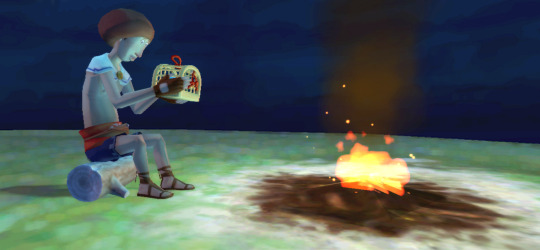
...with this guy.
Yes, Beedle. That Beedle. But before we can even jump into how he relates to any of this, we must travel further back still, to the very opening cutscene of Skyward Sword.
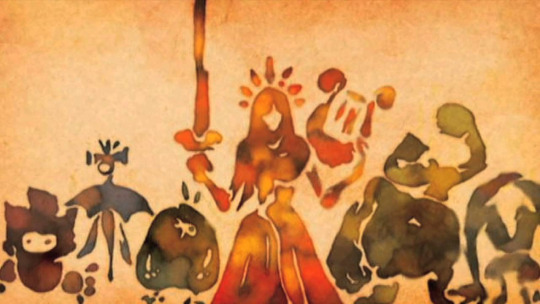
In this cutscene, we hear a very dumbed-down tale of how Demise invaded the surface world that was ruled over by the Goddess Hylia; to protect the sacred relic placed into her care by the Golden Goddesses, Hylia rends a piece of land from the earth and sends it skyward, leaving the Goddess Sword and the Triforce with it. Together with the remaining peoples of the Surface, she seals Demise away, and millennia later the events of Skyward Sword transpire. The entirety of this cutscene is not in and of itself very important, but I would like to draw everyone’s attention to one particular line uttered by the narrator during this sequence:
“To prevent this great power from falling into the hands of the evil swarming
the lands…
The goddess gathered the surviving humans on an outcropping of earth.”
It is worth noting here that - though the word “Hylian” itself only appears in reference to the shield which bears its name - Skyloft is comprised entirely of people with long ears. Keeping these things in mind, let’s go back to Beedle.
Beedle is, by all intents and purposes, a fairly unremarkable character in Skyward Sword. That is to say, outside of providing Link with goods throughout his adventure, he bears no significance on the plot in any capacity, having only a single sidequest that involves retrieving a pet beetle (snickers) of his, for which the player’s reward is a small sum of Gratitude Crystals. But there is one, throwaway line of completely optional dialogue you can trigger towards the beginning of this sidequest, and it is upon this line that the entire basis for this theory has been built. When meeting Beedle on his home island apart from Skyloft for the very first time, the player is given the option...
...to comment on his accent.
[after selecting “Your accent!”]
“Hmmm? The mellifluous timbre of
my voice sounds different to you?
...Perhaps a touch, I suppose...
But pray, what does it matter, hmm?”
What’s important to understand about accents is how they come about to begin with: namely, slight differences in pronunciation and rhythm of speech evolve over time as the language (in this case, some form of ancient Hylian) spreads to different locations. And of course, everyone who uses spoken language has an accent, but Link’s remarking upon Beedle’s is an indication that his pattern of speech is different from his own. In most other games, this would be unextraordinary - but in the context of Skyward Sword, where humanity has been isolated to a (relatively speaking) small outcropping of earth in the sky, it becomes extremely noteworthy. No one in Skyloft should have “an accent,” because theirs is a society and culture so small in scale that they should all have the same accent. Beedle having an accent makes sense if, and only if...
...he’s not from Skyloft.
And if he’s not from Skyloft, the logical conclusion would be that he must be from the Surface. In almost any other circumstance, this assertion would be smashed to smithereens by the sheer fact that getting to Skyloft without a Loftwing - companions blessed only to those who live in the sky - should be an unattainable feat. And yet, of all the people in Skyloft, Beedle is the only one who could have achieved such a thing...
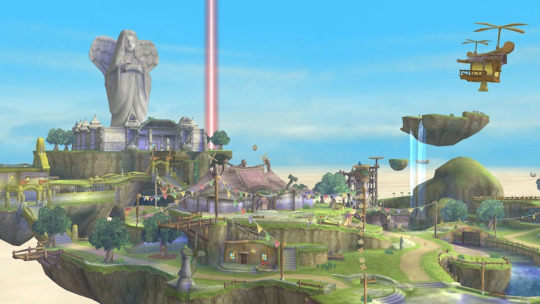
...because his shop - which conveniently doubles as his house - is an electricity-powered flying machine. Within the context of the game, such a contraption seems almost nonsensical; if he were from Skyloft, why would he not just set up shop in a permanent location? Even if he wanted to live on a smaller island by himself, the people of Skyloft could simply use their Loftwings to reach him (which they still need to do, anyway!). Indeed, the existence of Beedle’s Shop makes far more sense...if it already existed by the time he arrived there.
Which brings us back to that introductory cutscene. The narrator states that Hylia gathered up all of the surviving humans (notice the use of the word humans here) onto an outcropping of earth and sent them skyward, and on a surface level, this seems straight-forward enough - but with the revelation that Beedle is very likely from the Surface himself, it’s very obvious that this is nothing more than a bold-faced lie. Some humans were left behind - they couldn’t all possibly have fit on such a small piece of land - and those humans were the ancestors of Beedle, in some way, shape, or form. What became of those humans is another matter altogether (one I will address briefly), as the Surface we explore in Skyward Sword is perfectly devoid of human life, barring Impa.
Now, let’s bring it back home: remember how I said that all Skyloftians have long ears? That was a bit of a white lie, though only if you count Beedle among that number. In truth, Beedle’s ears are obscured by the bowl cut of his hair - but this is true for every game he appears in, and the general consensus is that they’re round. This would make Beedle the only round-eared human in the entire game...and he, coincidentally, happens to be from the Surface.
Before I go any further, I’d like to establish a very base reasoning for the existence of long-eared qualities in the human races of Hyrule. Hylians are far from the only ones to bear long ears, what with the trait also presenting themselves in the likes of the Sheikah and, by the era of Breath of the Wild, even the Gerudo - though it is exceptionally notable that in Ocarina of Time, the Gerudo have round ears, and Ganondorf is no exception...at least, at first.
Y’see, what’s especially notable about Ganondorf is that he is the same exact character is each title he appears in, and in The Wind Waker and Twilight Princess, his ears are long. This was actually something I only noticed quite recently, upon which I then fervently began scouring for information about his appearance in Ocarina of Time to try and make sense of it all, and the results are...very intriguing, to say the least. Below is a comparison of Ganondorf pre-timeskip vs. post-timeskip from the original Nintendo 64 version of the game:

As you can see, his model has changed in a number of ways, but... Well, I’m sure you can see where I’m going with this.
Amazingly, his ears got longer, which is...an interesting choice from a design perspective. Of course, it leads one to wonder why - and far and above the most significant thing to happen to him in the seven years between these two appearances is his procuring of the Triforce of Power from the Sacred Realm, a relic of the old gods. Evil or no, Ganondorf had forged a bond with a god unlike any had before him, and for some reason, this elongated his ears - so much so that by the time of Twilight Princess and The Wind Waker, they are indistinguishable from your typical Hylian’s. It is notable, too, that the Sheikah (who have always had long ears) also bear a special connection to the gods, living to serve Hylia and, later, her reincarnation as the princess in the Royal Family of Hyrule.
“They say we Hylians have big ears in order to hear the voices of the gods.”
So now, keeping everything I’ve talked about here in mind, I think it appropriate to go over the series of events that likely transpired, beginning from Demise’s invasion of the surface world:
In a bid to keep the Triforce out of evil’s grasp, Hylia formulates a plan to send both it and the Goddess Sword out of harm’s way. She selects - perhaps by chance, perhaps by choice - a not insignificant number of humans to live on this skyward isle, but naturally not all of them can make the cut. These chosen humans would go on to found Skyloft, a land whose culture revolves heavily around the reverence of the very goddess who saved them and enabled them to live in prosperity (the existence of the Wing Ceremony, the Statue of the Goddess, etc.), while the humans who remained on the surface, left in a world scarred by war and ravaged by monsters, sought new lands, becoming the ancestors of people who would found Holodrum and Labrynna, to name a couple. In their reverence of Hylia, the people of Skyloft would develop long ears, as even the Sheikah had - but the humans left on the surface world...would not.
That is to say, the Hylians we see in almost every major installment of the series are the direct descendants of the people of Skyloft, and round-eared humans are the descendants of the people Hylia left behind.
Of course, not all humans fled from their homeland - though we see none in-game, it’s important to remember that we also see no Sheikah aside from Impa, though we know they are great in number. Beedle was, undoubtedly, one of these very few stragglers, and with stories of a land beyond the clouds on his mind - legends that have been passed down over countless generations - he sought to find this paradise by any means, through sheer blood, sweat, and tears (but mostly sweat, if that cycling is any indication) if necessary. In the end, he was successful, and he lives among the people of Skyloft fairly unassumingly - yet he also lives apart from them, on his own island because, at his core, he is not one of them, and never will be. He doesn’t get all of this Hylia stuff, and frankly, he doesn’t care - so long as he can chill on his own little crop of land with a full belly, a full wallet, and his pet beetle, that’s really all that matters.
And speaking of Hylia - the reason they are called Hylians is because they are the descendants of those chosen by Hylia, even if the knowledge of Hylia’s existence has largely been lost to history by the events of Ocarina of Time and beyond. (In a very similar vein, it is my belief that Lake Hylia also gets its name from her because the crater that would later become that very lake was formed...when she lifted a gargantuan outcropping of earth into the sky.) Hylians largely dominate Hyrule for so much of its history because the people of Skyloft were the ones who founded it - yet by the era of Twilight Princess, we see that a great many of the humans who had moved onto different lands have slowly but surely made their way back towards the place they once called home.
But I would be remiss to neglect to go back to Breath of the Wild; this game is a much more peculiar case, taking place in an era many millennia after any game that came before it, where reverence for Hylia is once again commonplace - so much so that statues bearing her resemblance have been erected in every town, village, and city across the country. Humans are once again practically nowhere to be seen (except, again, perhaps for Beedle), and even the Gerudo, who have now long intermingled with Hylians for the sake of having children, have inherited the trait (perhaps in part due to the fact that some of their own may worship Hylia, if the statue in Gerudo Town is any indication). In every single instance, no matter where you turn, these long ears seem to be a direct correlation to the people’s connection to the gods of Hyrule - but rather than their ears being a predetermined factor in how strong this connection may be, it seems that their faith is what influences this trait to rise to the surface, over how ever many generations or centuries that just might take. (Ganondorf Dragmire, who lives in a castle and inherited a relic of pure godly power, is an outlier and should not be counted.) As Shad so eloquently states in Twilight Princess:
“Hyrule was made by the Hylians, who, as we all know, are the closest race to the gods.”

And as long as we’re talking about Shad, I’d love to begin wrapping up this post by bringing things round to Twilight Princess once more - specifically the context in which Shad says the above quote, which is far and away one of the most peculiar instances of casual lore-dumping in the entire series. The quote in its entirety from the North American version of the game reads thusly:
“At the moment I'm absolutely entranced by the sky beings known as the Oocca. Yes, according to legend, Hyrule was made by the Hylians [...] But also according to legend, long ago there was a race even closer to the gods, and some say these creatures made the Hylians. When they created the people of Hylia, they simultaneously created a new capital, a city that floated in the heavens.”
What Shad is saying here is extremely farfetched, particularly for those of us who are familiar with the Oocca. But in truth, this was a minor mistranslation on Nintendo of America’s part; the original text from the Japanese version of the game clears actually reads much more like this, when translated correctly:
“The common opinion is that Hyrule was created by the Hylia people, the race closest to the gods, but...truth be told, there's also a theory saying that in ancient times, there was a race even closer to the gods than the Hylia people, and THEY created it [Hyrule]. And they, simultaneously with the birth of the Hylia people, created a new capital, a capital that floated in the heavens.”
So the Oocca - the bizarre, Cucco-like creatures who inhabit the City in the Sky - did not create the Hylians, but rather established the kingdom of Hyrule itself in the world that the goddesses created. But even with this mistranslation squared away, that still sounds incredibly odd, especially taking the events of Skyward Sword into account; we know that the people of Skyloft are the ones who inevitably found Hyrule, because we see the beginnings of this happening at the end of the game. Funnily enough, it seems that the very line that was mistranslated in the North American version of the game...was the result of mistranslation itself.
In-universe mistranslation, that is. Millennia of history being told, written, lost, and found, translated again and again and again, until it barely resembles its original state. What likely happened was that the Oocca, who live in the sky, were wrongly credited with the creation of Hyrule because the Hylian people who would go on the found Hyrule also came from the sky, as they were the people of Skyloft. Shad’s claim that the Oocca were “a race even closer to the gods" than the Hylians may not be entirely unfounded, however, as it is incredibly likely like the City in the Sky we see in Twilight Princess is what remained of Skyloft after its human inhabitants abandoned it; the Loftwings that the people of Skyloft had for so long relied on would go on to evolve into more sentient beings, suspending the city above the clouds long after Hylia’s magic had worn off - and Loftwings were, as the people of Skyloft believed, beings bestowed upon them as a symbol of the goddess’s divine blessing. In this sense, it is somewhat true that the City in the Sky and the Hylians were created at the same time; when the Skyloftians abandoned their home to live in a new land where they were not long after christened the Hylians, the skyward isle that they had left behind found a new purpose, and a new “city” was born.
Of course, maybe Shad was off his marbles (even if the Oocca are evolved Loftwings, there is still much about them and their connection to the Sheikah that remains shrouded in mystery), but the crux of this entire narrative is that the people of Hylia, the Hylians - at least, up until Breath of the Wild is concerned - were the descendants of the people of Skyloft, and Beedle’s eccentricities in the context of Skyward Sword are rather convincing pieces of evidence that this did not comprise all people of the formerly-known-as “Land of Hylia.” It is therefore only natural that a conclusion could be drawn about where the distinction between the two peoples comes from.
But in the end, even if this can answer the question of why there are round-eared humans alongside long-eared ones, it does not answer the ultimate question of what this distinction means. Why does a connection with and a faith in the gods elongate the ears of the people it touches? The Zelda Encyclopedia states that “in the past, Hylians were able to wield magic of considerable might,” a trait that could possibly distinguish them from your typical human being - but the canon nature of the Encyclopedia is...shaky*, at best, and downright disrespectful at worst. Link and Zelda are two Hylians we see wielding abnormal abilities, but their power can be explained with their respective pieces of the Triforce, not to mention the countless magic users in Hyrule and beyond who aren’t Hylian. Even if there was a time when the Hylians had special abilities, those abilities have long since faded. They are no no taller, no smaller, live no longer than their round-eared counterparts; they are, in every aspect aside from the length of their ears, in every way identical. To finish the quote by the unnamed Hylian man who speaks to a young Link in the Castle Town Market in Ocarina of Time:
“They say we Hylians have big ears in order to hear the voices of the gods...but I've never heard them!”
So...there you have it. I must admit that it is entirely possible that the people of Skyloft had developed long ears before their ancestors had been sent to the heavens - after all, the Sealed Temple was, in millennia past, a temple erected in her honor. Yet this would also make the story of Hylia gathering the “surviving humans” in order to save them all the more grim; could the gods be so callous as to save only those who respect their divine might? One cannot help but think of the Great Sea in The Wind Waker - for in a world populated by the descendants of those who were chosen by the gods to survive the coming floods, it is difficult not to notice that ears of the round variety are once again nowhere to be found.
And yet, when you get right down to it - though some Hylians seem to rely on their lineage as “the closest race to the gods” to maintain an image of self-importance - the difference between a long-eared Hylian and a round-eared human appears to be, ultimately...only that. And unless we see our round-eared friends return in a potentially future title, and the difference remarked upon, that will likely be how things remain.
Until that time, I will continue to do my best to fill the gaps with which we have been left - even if, at the end of the day, I’ve written nothing more than a meaningless, nine-page word jumble...about ears.
EDIT (5/9/2020): It has been brought to my attention (courtesy of @heartenvy) that there is a mild inconsistency with the narrative that Beedle could be from the Surface: namely, the “unbreachable” Cloud Barrier, something Hylia herself created to divide Skyloft from the Surface and keep its inhabitants and the Triforce safe. However, I would argue that the Cloud Barrier is not a physical barrier so much as it is a mystical one, meant to both keep its location secret (the barrier itself is completely invisible from the Surface) and to ensure the people of Skyloft remain complacent in their isolation (believing Skyloft is all there is, they remain there, and in so doing their long-forgotten secrets are kept safe). Zelda is pulled through it long before any proper portals are actually opened, and I would argue that the portals (that is, the pillars of light that appear when we place the corresponding tablets) are largely a gameplay mechanic meant to keep the story linear, as in a real setting Link would have simply ridden his Loftwing to and from the Surface and would have been able to fly anywhere he chose. It’s possible the barrier acts to keep out evildoers, specifically (which would explain why Ghirahim had to summon a vortex to pull Zelda through it, where he could reach her), or, not unlike the Isla de Muerta in Pirates of the Caribbean, Skyloft could very well be “an island that cannot be found except by those who already know where it is” - which, to me, makes the narrative of Beedle finding his way there all the more entertaining (the dude must have been, like, super determined). In any case, I stand by what I’ve stated before: that Beedle is from the Surface, as his accent and the peculiarities of his shop make too strong a case to ignore.
* * * * *
*The Zelda Encyclopedia states that Termina is a Dream World, despite Link’s Awakening having already done this and in a much more satisfying way. I can’t take anything it says seriously.
(Special thanks to @ghiirahiims for the high-res screenshot of Beedle, and shoutout to @gaybellatrix for in no small part convincing me to finally sit down and write this all up.)
#twilight princess#skyward sword#legend of zelda#tloz#loz#with honorable mentions of#ganondorf#beedle#shad#ocarina of time#loz meta#boy howdy writing this was quite a trip#if the read more doesn't work on mobile i am so sorry#here it is. the Great Hyrulean Ear Lore.#if anyone actually reads this please for the love of god at least leave a like#gaybellatrix#ghiirahiims#long post#bezu#analysis#mywriteups*#myposts*
2K notes
·
View notes
Text
Recent Media Consumed
Books
The Silmarillion by J.R.R. Tolkien. About ten or fifteen years ago, I tried to read this and was totally overwhelmed by it. I kept it around, hoping maybe someday I might be able to read it. I finally have, and here are my impressions: WHY SO MANY NAMES. WHY YOU HAVE TO NAME EVERYBODY, AND EVERY TRIBE OF PEOPLES, AND EVERY INANIMATE OBJECT, AND EVERY LANDSCAPE FEATURE. WHY. *ahem* So. I have a general comprehension of the events of The Silmarillion, but I dealt with it by doing what you do for an impressionist painting. I (mentally) stepped way back and let all the names flow by me, and if there were names that were repeated a lot, then I mentally attached appropriate plot points and character details to those names so I could track with who they were and what they were doing. And, actually, I found myself able to hang on and enjoy the book for the most part. This is going to lead into a re-reading of the Lord of the Rings books, since I haven’t read those in about as long…
The Hobbit by J.R.R. Tolkien. I haven’t read some of these books since pre-teen years, with one required re-read of The Two Towers in high school (i.e. it’s been many an age since I’ve read these and my memory of the stories has been far more heavily influenced by the movies). In re-reading the first book, I was struck by the extreme tone shift for the Elves and Dwarves. Elves seem much closer to happy, mischievous fairies than these ethereal, solemn pillars of elegance and grace the movies show them to be. And Dwarves are far more bumbling and craftsmanlike than the movies show. Aside from that, The Hobbit was a pretty solid adaptation from the book, and the book also reminded me that this story was the first time I experienced “NO, MAIN CHARACTERS DON’T DIE, HOW DARE YOU,” and probably was the first book to make me cry. I must have been 8 or 10 years old. I FORGOT HOW MUCH THIS STORY INFLUENCED ME.
A Conflict of Visions by Thomas Sowell. I have a longer-than-usual list of things to say about this book. First is that it was just that level of difficult that I was struggling to understand while reading it (on Audible), but I think I got it. Sowell has several base concepts that I see repeated throughout his books, though he does like to dedicate whole books to specific aspects of the same topic. He is pretty damn thorough that way. So, for example, I would put this book in the middle of a three-book spectrum of similar concepts: Intellectuals and Society (most concrete and easiest to read), A Conflict of Visions (next-level abstraction, a little difficult to read), Knowledge and Decisions (root abstract concept, very difficult, I have not been able to get past chapter 2). The second thing I have to say is about a couple interesting concepts it proposes. Its whole point is to help readers understand the roots of two ways of seeing the world that come into severe conflict politically, and he calls them by their root titles: the constrained and the unconstrained visions. He traces the path of each back through the intellectuals that most spoke of them (tending to contrast Adam Smith with William Godwin and Condorcet). Though he leans heavily toward the constrained vision (based on reading his other works) he does his best to make this book an academic study of both, with both of the visions' strengths and flaws and reasoning and internal consistencies fairly laid out. In doing so, he helped me understand a few things that make this situation really difficult for people on opposing sides to communicate. One of them is that root words and concepts literally mean different things to different people. I had some vague notion of this before, but he laid out three examples in detail: Equality, Power, and Justice. It was kind of astounding to see just how differently these three words can be defined. It makes me think that arguing about any specific issues rooted in these concepts is fruitless until first an understanding has been reached on terms, because otherwise two parties are endlessly talking past each other. Another really interesting idea he brought up is the existence of “hybrid visions” and he named both Marxism and Fascism as hybrid visions. This was especially fascinating to me because I have seen the accusation of “Nazi” flung around ad nauseam and I wondered how it was that both sides were able to fling it at each other so readily. Well, it’s because Fascism is actually a hybrid vision, so both sides have a grain of truth but miss the whole on that particular point. In any case, this was a little difficult to read but had some fascinating information. For people who are wondering what on earth this gap is between political visions, how on earth to bridge the gap, or why the gap even exists in the first place, this is a really informative piece.
Movies
The Hobbit & Fellowship trilogies (movies). I mean, it’s definitely not my first watch, not even my second. But I went through it with Sergey this time and that means the run-time is double because we pause to talk and discuss details. This watch came about partly due to Sergey’s contention that Gandalf’s reputation far outstrips his actual powers, so we ended up noting down every instance of Gandalf’s power to see if that was true. Conclusion: Gandalf is actually a decently powerful wizard, but tends to use the truly kickass powers in less-than-dire circumstances. That aside, this movie series was always a favorite for me. I rated The Hobbit trilogy lower the first time I saw it but, frankly, all together the six movies are fantastic and a great way to sink deep into lore-heavy fantasy for a while. And I’m catching way more easter-egg type details after having read the Silmarillion so it’s even more enjoyable. (finally, after about a week of binge-watching) I forgot how much this story impacted me. I forgot how wrenchingly bittersweet the ending is. I forgot how much of a mark that reading and watching this story left on my writing.
Upside-Down Magic. Effects were good. Actors were clearly having fun and enjoying everything. Story didn’t make enough sense for my taste, but it was a decent way to kill flight time.
Wish Dragon. So, yes, it’s basically an Aladdin rewrite, but it’s genuinely a cheesy good fluff fest that made me grin a whole lot.
Plays
Esther (Sight and Sound Theatres). < background info > This is my third time to this theatre. There are only two of these in existence and they only run productions of stories out of the Bible. The first time I went I saw a production of Noah, the second time I saw a production of Jesus. My middle sister has moved all the way out to Lancaster, PA in hopes of working at this theatre. My husband and I came out to visit her. < /background info > So. Esther. They really pulled out all the stops on the costumes and set. I mean, REALLY pulled out all the stops. And the three-quarters wrap-around stage is used to great effect. I tend to have a general problem of not understanding all the words in the songs, but I understood enough. I highly recommend sitting close to the front for immersive experiences. This theatre puts on incredible productions and if you ever, ever, EVER have the opportunity to go, take it. Even if you think it's nothing but a bunch of fairy tales, STILL GO. I doubt you'll ever see a fairy tale produced on another stage with equal dedication to immersion.
Shows
The Mandalorian (first two seasons). Well. This was pretty thoroughly enjoyable. It felt very Star-Wars, and I’d kind of given up after recent movies. Felt like it slipped into some preaching toward the end? Not sure, I could be overly sensitive about it, but I enjoyed this a lot (though I did need to turn to my housemate and ask where the flip in the timeline we were because I did NOT realize that the little green kid IS NOT ACTUALLY Yoda).
Games
Portal & Portal 2. Portal is probably the first video game I ever tried to play, back when I had no idea what I was doing. Back then, I attempted to play it on my not-for-gaming Mac laptop. Using my trackpad. Once the jumping-for-extra-velocity mechanic came into play, I just about lost my mind trying to do this with a trackpad and gave up. Later I returned to the game and played it with my then-boyfriend on a proper gaming computer. Now, after having played several games and gotten better at "reading the language" of video games, I decided I wanted to see if I could beat the Portal games by myself. Guess what. I BEAT 'EM. Yes, I remembered most of the puzzles in Portal so that's a little bit of a cheat, but I'd say a good 2/3 of Portal 2 was new puzzles to me. It is crazy how proud I feel of myself that I could beat Portal 2, especially. Learning how to play video games at this age has really knocked down the lie, "You can't learn anything." Though I still suck at platformers and games that require precision. Since I find those types frustrating, I probably won't be playing many. Games are about enjoyment, so I'll push myself a little, but not to the point where I can't stand what I'm playing.
The Observer. I like the concept and the art but I don't think I could keep trying to play this game. It's really depressing. My in-game family members all died of illness or accident or committed suicide. I also kept getting executed by the state. In order to keep us all alive I'd have to do pretty terrible things that I have a hard enough time contemplating even in a fictional setting.
Baba Is You. Fun and interesting concept, but I got stuck pretty early on. Don't think I want to push as hard on this one.
14 notes
·
View notes
Text
DTeam Tumblr Demographics Survey Results (Part 2):
What does DTeamblr look like, what does it have to do with MCYT history, and why does it look like a rainbow?
I’ll make an educated guess here and say y'all enjoyed my last post (totally unrelated to the way I gained almost 50 followers overnight). Anyhow, thank you so much for the overwhelming support! I’m so glad a lot of you felt you could relate to my deep-dive into the leading personality type on DTeam Tumblr. It took me so many hours to write and research, and as a math major and honors student, it’s no easy feat, so I’m so grateful for the attention it got!
Today we’re discussing the general demographics of DTeam Tumblr and why they might look the way they do. Number 8 will blow your mind! So make sure to keep reading and hit that little grey heart and arrow at the bottom if you like it, so more people get to see it! Thanks for your support! Now, let’s jump straight into the post!
Your Daily Dose of Data
From the 449 responses we received, these are some pie charts displaying the gender, age, and sexuality of all respondents.
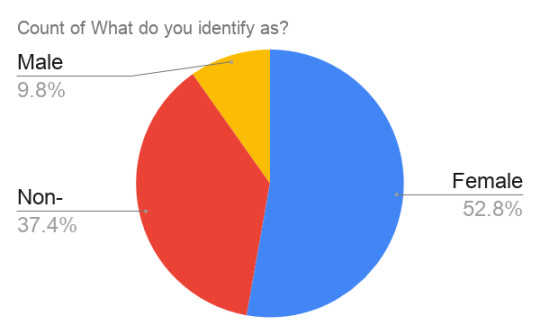
Image Description: Female (52.8%), Non-Binary (37.4%), Male (9.8%)

Image Description: 16-17 (37%), 13-15 (31.4%), 18 and over (29.4%), 12 and under (2.2%)
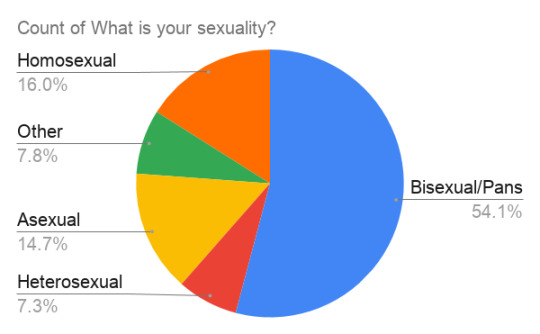
Image Description: Bisexual/Pansexual (54.1%), Homosexual (16%), Asexual (14.7%), Other (7.8%), Heterosexual (7.3%)
Mmhm, delicious! Y'all ready to dig into these stats? Because I don’t know about you, but they certainly don’t strike me as what the general population looks like!
Welcome to Tumblr, the Only Community Where Straight Men are the Minority
So these statistics certainly didn’t take me by surprise. Mostly because the DNF Shipper Survey I took some time ago revealed a similar trend. Not to mention, Tumblr is probably the QUEEREST internet community on the planet.
Funny enough, the survey revealed a shocking number of ZERO heterosexual males respondents. I’ll say it louder for the people in the back. ZERO straight males were recorded out of 449 respondents for this survey!
Now, this isn’t surprising for the Tumblr community by itself, but I can say I’m somewhat surprised in terms of the MCYT Tumblr community. (Obviously, the survey specified DTeam Tumblr, but there is a big overlap between both communities, so I will be using them interchengably when it seems relevant.)
Let’s break this down. The survey reveals the largest age population is 16-17, though it’s not by a great margin in comparison to 13-15 and 18 and older, which doesn’t surprise me either. Some of the major critics of the DTeam Fandom and other MCYT Fandoms love to claim the fanbase’s majority age range lies with children and pre-teens. While it’s an undeniable fact children are drawn to Minecraft, it’s also a misconception to paint it as solely a community for younger viewers.
In the MCYT Tumblr and DTeam Tumblr communities, specifically, we see this is not the case. Only 1/3 of the respondents of this survey are under the age of 16 (you could attribute part of it to the fact younger people might be less inclined to participate in this survey, but it is still a notable difference). I can’t say these age ranges are similar in other parts of the community like DTeam Twitter, Tik Tok, or Reddit, but if I had to make a guess, I’d say Tumblr lies toward the older of the bunch, with Reddit being the oldest and Tik Tok being the youngest (I do hope to perform this survey on some of the other communities, so please stay until the end if you want to help with that).
One of the likely explanations to why the ages for DTeam Tumblr look this way is the fact a big chunk of the community has likely been watching MCYT for a long time (even with breaks in between). I, myself, used to watch channels like PopularMMOs, Aphmau, and PrestonPlayz as a kid, and I presume many of you are familiar with them as well. With the resurgence of MCYT in the past year, it likely drew a lot of the older viewers in addition to the new ones.
But enough about age. What I really want to highlight on this post is the attraction of queer individuals to DTeam Tumblr and MCYT as a whole.
Why is the current MCYT Fandom so queer in comparison to the previous generations?
This is a huge open-ended question and considering I can only capture so much of the DTeam and MCYT community, the rest of this post should be taken solely as a theoretical analysis as opposed to fact.
With that out of the way, let’s start by discussing the shift MCYT has undergone over the years (I promise this will circle back to the question of queerness in the MCYT fandom, but we need some background before we can come up with a decent theory).
When Minecraft was first released, it proved to be a monumental change in the gaming industry. This simple little indie game took the world by storm. It was so vastly different from what the general population generally viewed gaming as (first-person shooters, story-driven games, action games, etc.) Not to mention, it didn’t exactly solely appeal to only a small margin of gamers, those being white cis males.
The gaming industry has notoriously been known in the past for its heteronormative community and general prejudice toward minorities. Though it has gone through a significant change over the decades, we certainly can’t say it’s fully gone.
Yet for whatever reason, the recent MCYT has taken the interest of so many queer people in comparison to other gaming YouTube communities. Why? Why are queer people so drawn to this community? And, more precisely, why does it feel so different than the old MCYT? Lastly, how does this relate to the conclusion about the leading personalities of this fandom we made in the last post?
The Niche Communities of MCYT Over the Years
MCYT has always been a huge, over-saturated genre of YouTube with content appealing to a variety of audiences. It’s dominated gaming content for years, and I think we can all safely say it’s never been bigger than it is today.
So why is it that just now it feels like the queerness of the fandom is popping off? Why now as opposed to say five years ago when MCYT was at another one of it’s strongest stages?
It seems like the community has made a tremendous shift in relation to breaking gender norms and LGBTQ+ subjects, not only in the fans but within the creators themselves. Was flirting and calling a pretty-boy streamer pet names as normal in the past as it is today? Were straight gamer guys putting on dresses and a full-face of make-up as supported back then? Were “marriages” and “pregnancies” within Minecraft boys an everyday occurrence like they are now? How is it that MCYT has dominated a Twitch dating show where flirting with the gay host and among straight contestants themselves is just another bit of entertainment? Where is this all coming from?
Recently, I watched a 2 hour documentary depicting all of the stages of Minecraft YouTube and how it has changed over the years. If you haven’t seen it and you have some time to spare, I HIGHLY recommend it! It’s very informative, and it honestly gave me such a strong sense of nostalgia that makes me choke up every time I think about it. I’ll link it below.
The documentary does a great job at exploring the different niche communities that dominated MCYT since it first took off. Some of such communities include the basic Let’s Players, the team-based Let’s Play channels like How2Minecraft, the roleplay story-centric ones like Aphmau and Samgladiator, the tutorial, building and technical side like Mumbo and Grian, the PVP-centric Bedwars or Hypixel channels, the Machinima community, the comedy side like ExplosiveTNT, the parody music videos, and so many more. All of the mentioned communities have dominated Minecraft at one point or another, many of them still having a rippling effect and/or a loyal community today. All of these communities have certain aspects that define them, some of which parallel the current overtaking content in the present.
How can we compare MyStreet to the Dream SMP?
Taking Aphmau as an example, her MyStreet series had a TREMENDOUS success a few years ago, racking in millions of views and bringing in a lot of money that eventually allowed her to hire voice actors and increase the production of mentioned episodes. The roleplay series was so successful it ran for six seasons!
Now, let’s compare that to the Dream SMP. It seems like a big comparison to be making considering they appear so different at first glance. For once, Aphmau is just one channel whose audience caters toward girls and younger people who enjoy romance. The series is set-up in an episodic-format that resembles more of a TV series than actual Minecraft videos.
Meanwhile, the Dream SMP is a collection of content creators with a mix of improvised storylines and the occasional regular video that resembles more of a Let’s Play series than a RP series.
You could say the only true comparisons to draw out of these two are the popularity they had/have and the profit they brought to their respective creators.
However, there’s two other key similarities that you’ll find not only within these two specific examples, but many other channels and communities as well. Story and characters.
MyStreet’s story aspect is fairly obvious seeing as it’s a episodic series that focuses on a fictional story. The Dream SMP’s story aspect isn’t as clear, but it’s evident there is a story playing out in the foreground and background, whether intentional or unintentional, or improvised or not.
Character is where some of you might start to question me. It’s obvious MyStreet has characters. I mean, it is a fictional story, after all. But the Dream SMP? Light, they’re obviously people!
Well, my answer to that is yes and no--sort of. The Dream SMP’s story heavily relies on roleplay, bits as you might call them. Events that aren’t necessarily planned out as a fictional plot like the typical MyStreet episode is, but they aren’t exactly real. Schlatt is obviously not a villain in real life, he just likes to impersonate as one for the narrative. Wilbur isn’t crazy, but it’s a way to spice up the heroic story surrounding Tommy and him.
It’s video-game improv. Except the actors behind the content just so happen to be real people playing off the personalities and “brands” they have obtained.
Brands. It all boils down to this. In the entertainment business, without a clear vision of your project and a clear way to brand what your consumer intakes, your project will likely not find a lot of success.
There’s a reason why Tommy plays off his loudness, using an overexaggerated laugh that although may not be completely fake, it is likely not the laugh he uses everyday. Or why BadBoyHalo is this supposed innocent muffin who doesn’t understand the crafting table meme and other references that are fairly easy to google and find the meaning of. Or why Sapnap is this chaotic being who loves starting pet wars and we love to paint as an arsonist in the Dream SMP. While all of these personality traits may be a part of their true selves, they’re played up for the camera--for the story. They act as the personas that define their characters in the narrative.
They have a clear brand and vision that appeals to the audience and makes them tune in on the daily to see how they all come together. It’s like roleplaying a more extreme version of yourself, one that brings home the money.
Story and characters run across every entertainment outlet. They define their brand. Aphmau has her characters and series. Hermitcraft has a set of memorable personalities and episodic videos that formulate its own story that is less like a narrative and more of a history of the server. ExplodingTNT has his recurring cast and comedic sketches. Most of these niche communities have a form of story and character defining them. It’s how they achieve a clear sense of branding and cater to a specific audience.
Queer Theory in MCYT
Having said all that, why does the MCYT of today draw in so many queer viewers?
Let’s think about this. In my last post, I ended by mentioning DTeam Tumblr is a sort of safe haven for INFP and INxx types who might be placed in the “other” category by society. INFPs, specially, are predisposed for escapism--one common form of it being fiction and entertainment. Not to mention, INFPs are feeling types who, as introverts, seek a personable connection. It’s why it’s so easy for them to obsess over book characters or fall in love with content creators.
Now, let’s imagine a whole community of LGBTQ+ INFP and INxx types. Actually, scratch that, we don’t even have to imagine it.
It’s what our community looks like today.
And why are so many so drawn to the DTeam and Dream SMP of all things? It’s a personable storyline that essentially forms a direct tie to the viewer. Unlike pre-recorded fictional TV series you tune into on your device, the Dream SMP is a whole load of chaos that blurs the lines between reality and fiction where fans can directly connect to creators and get to know them as people through a storyline that features sub-textual queer themes and non-conforming behaviors.
The MCYT content creator community of today is more non-conforming than ever before, and knowing this whole fact, knowing that many of them might place themselves in the “other” category or at the very least aren’t afraid to break the norms and be seen in that light, is a comfort in itself for LGBTQ+ INFP types. Once again, it’s a safe space that helps you escape from the troubles of real life, one you relate to.
Okay. So although this does answer why the fans look like they do, what about the creators themselves? Are we really supposed to believe this all came through naturally? That a bunch of straight guys suddenly decided wearing dresses was something they wanted to do?
I don’t mean to sound cynical here, and I’m in no way trying to insinuate creators have solely some sort of corrupt ulterior motive. Things are never as simple as they look. However, the truth is, a part of it lies on the attention it’s gotten.
I’ve talked a lot about DreamNotFound and the way Dream uses it as a marketing ploy. I stand by my point. However, he’s not the only one who does this in the MCYT community. Why did Finn suddenly go from wearing a dress to cross-dressing as a girl for a whole week? Why are so many creators suddenly deciding wearing dresses is fun? Why does every freaking straight MCYT actively want to flirt with George nowadays?
Let’s just let Techno’s favorite word answer this for us: clout.
It gets attention from one of the largest historically underserved minority community in the entertainment business. We might not be able to see gay flirting in every Netflix TV show or guys not minding dresses and getting fake marriages, but you are certainly going to get at least one of those in every Dream SMP stream and video you tune into. It gets attention. It brings home the money. And do I blame them? Not really.
Interestingly enough, there’s a lot of analytical posts on the MCYT Tumblr community that discuss the dangers of these tactics and why gay jokes and the way queer subtext is treated by MCYT creators is harmful. Despite this, it still attracts such a huge community of queers. So why exactly would queer people actively watch something that’s offensive or harmful to us?
I have a lot more to say about this topic and the morality behind Dream’s tactics, but I’m out of breath for today, so I’ll talk about it in my next post. What better way to start the conversation about the DNF and Karlnap questions of the survey than a good ol’ discussion on the morality of queerbaiting and the likes?
If you got this far, I’d appreciate it if you liked and reblogged this post if you enjoyed it and/or learned something new! Also, important news, I would really like to perform a similar study on the DTeam Twitter Community to measure the differences in demographics across platforms. I would REALLY appreciate it if you guys could go like, retweet and share the link I posted on my Twitter about it (tweet will be linked in the reblog below) so it reaches more of the DTeam Twitter community!
However, if you filled out the survey yourself here or you associate more with DTeam Tumblr than DTeam Twitter please DO NOT fill out the survey again! I’m trying to make sure it reaches the audience that mains on Twitter, but I need a little help with that since I don’t have as big of an influence on Twitter than on here for obvious reasons.
Anyhow, thank you so much for all your support! I really appreciate y’all and make sure to hit the follow if you want to lookout for the next demographics post! <3
(Pssst, I’m releasing a MCYT DNF superpower AU longfic next month... You should totally go check out the post on that if you’re interested in it...)
#dteam#dteamblr#dream smp#dttblr#mcyt#dreamwastaken#dnf#mcyttblr#georgenotfound#dreamnotfound#dttwt#dream team#dteamblr demographics survey
103 notes
·
View notes
Text
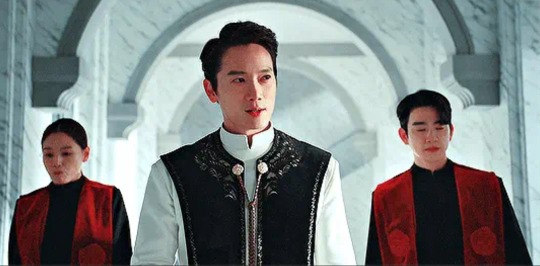
The Devil Judge, Ep.1 Meta
(On the re-imagined justice process, imageries, parallels in South Korea and our world today)
As with all dystopian fiction, it is not exactly a far-fetched imagining of our world. Instead, it is a critique of our society which seeks to amplify the inequalities and suffering of society through some exaggeration.
The Devil Judge is that: it "re-imagines" South Korea today with a sprinkle of cyberpunk aesthetics (a little too much bluish green tint) and dystopian imagery (of homeless people, a very dirty subway and dingy backalleys on a rainy night).
I kept thinking it was a dystopian "future" but was wondering why they were using only Samsung Note 20 instead of some Samsung futuristic prototype phone. So, those phones do keep audiences grounded in the reality it is portraying -- this is the alternative South Korea of today.
We are barely halfway into the first episode and we've got this extremely charismatic, anti-hero male lead strutting red carpets and making verbose declarations like "I am the power. By the judicial authority delegated to me by the people of Korea, I will run this court. And it is the people who hold this power." (Not verbatim but that's the gist).
Then, meet associate judge Kim Ga-On who seems to be against how the system is running. He seems to be the outlier who rose to his ranks from the bottom class of society (which his colleague Oh Jin-joo says, he looks like he's from the shanty town of Seoul). We start off, barely into the drama at this point, with a dramatic scene of a kindergarten bus ramming down barricades and charging towards the Court building. A group of kindergarten children crossing the road there (I've just no clue what businses kids would have near the court building tbh). A little girl tripping as they were rushed across the road, Ga-On jumping to the rescue, and unable to pick her up in time, shields her with his own body. Kang Yo Han is just there, taking a heavy gun from the guard and unhesitantly opened fire at the bus driver who was flooring the pedal. He misses the driver's head and hits the headrest before firing again. The bus swerves and flips. The driver loses consciousness and Ga On (again!) jumps to the rescue. So, here the tone is set. We've got this "devil judge" who seems to be the ultimate modern day anti-hero who's given immense amount of power.
Much more interesting is that in this dystopian South Korea, we've got what seems like a publicly elected judiciary (or Kang Yo Han is perhaps the first?) and that has always been something that has been discussed in legal academic. Not the idea of electing the judiciary but that the argument of the judiciary not being publicly elected can be seen as slightly out of tune with democracy. (In legal academic, however, this is theoretically seen as being balanced by the separation of powers; ie. the executive branch (=government) and elected members of Parliament/Congress are supposed to be fully separated from the judiciary and should therefore never interfere with the judiciary. But, of course, these are all theoretical stuff. They look good on paper and when discussed in legal essays but in reality, it can often be different (if not, the exact opposite). This series takes things to yet another level by imagining the inception of a publicly televised and publicly voted trial.
This goes against the nature of trials in general because in our world today, the judiciary (wherever it may be) typically have mechanisms (ie. laws and codes) to prevent manipulation by media. The principle of fair trial requires that no external influence affects the process of adjudication (ie. the judgement by judges). There also tends to be avoidance of trial by public opinion because the way the law is interpreted and applied can be rather technical and different from what people may say or think about a certain trials, the decision delivered and also sentencing. Trial by jury is the nearest it gets but that too can be a fairly technical process which do also include considerations like avoiding a two-day trial to prevent influence by the media or other agents on a jury member's decision. (A recent drama mentioning this is Law School). The thing about this idea of trial by the public is that standards of morality can be very subjective and varies from person to person. Judgement by judges are not entirely free from the influence of morality, but the process is a litle more stable through the processes of interpretative practices, case precedents and legal theories. Previously in another Kdrama, Miss Hammurabi (2018), Judge Lim Ba-reun became slightly frustrated by his friend's comment that having a jury trial is like "true democracy" because the "people gets to decide" and he even thinks the judiciary should be elected too. Lim Ba-reun sarcastically said he must have loved every elected politican since they were elected by the public. He tells him grimly that no jury has ever found a policeman who had beaten up a Black man to be guilty. He also pointed out that Nazi, the Holocaust and Hitler were all supported by the public.
In this series, the premise allows all of these imaginings to be realised and played out. It is peak criticism, I think, when they portray the scenes of the TV producer being excited about the real-time ratings and viewer ratings. And also the scene of the broadcasting channel's chairman dancing in joy when he received realtime report of the ratings (vowing to treat his equally wealthy friends to a meal). Even when his other friend seemed appalled by the decision delivered by Judge Kang, the Chairman could not hide his joy in the skyrocketing viewership ratings. This really reminded me of the entire Produce 101 franchise which also heralded the shows for putting the decision in "The Nation's Producers" (ie. voters) and emphasised how it is the Nation Producers who put together ("produce") the National Kpop group that is bound for success and set to receive national love. All of this illusion collapsed (and the Korean franchise died along with it) when the court finds its producers guilty of voting manipulation. The Devil Judge seemed to have a similarly dramatic flair in its emphasis of TV production gimmicks, camera angles, cuts of a person's reaction, etc. The President of South Korea (who has a very light voice, a penchant for orotund speeches and a lack of concern for national policies) and all these top 1% of people tuned in were on the edge of their seats watching Judge Kang orchestrate this theatre of public trial. Kim Ga-On watched him closely and was sure that Judge Kang had something up his sleeves and was definitely up to no good, yet he couldn't tell. When he finally delivers a verdict (that yes, this was a case of professional negligence and not negligent homicide), Ga-On was crestfallen and frustrated because it carries a mere 5 year imprisonment maximum. But Kang turns the table and brings up the newly passed legislation which allows accumulative sentence which then resulted in 235 years of imprisonment.
This sounded very much like how some Korean netizens had previously wondered (online) why Korea couldn't have a sentencing system like the US where the years of imprisonment can go up to 100 years or 500 years. Again, this was like realising an alternative South Korea that many have perhaps tried imagining. Episode 1 ends with Judge Kang stepping down from his high seat when a victim's family member bowed deeply with her hands clasped, as though in prayer, and even kneeled to him. This corresponded well and tied perfectly into the religious/godlike imagery represented in the justice's robes which is reminiscent of the pope's robes and resembles a priest's robe, and the app they named DIKE or Diety of Justice (正義의 神). When Judge Kang hugs the old woman with a compassionate smile, teary eyed and full of empathy, he ends up yawning barely a minute into consoling the weeping woman. Ga-On witnesses this and realises, all of this must have been a gimmick after all. He had his hopes up when Judge Kang serves the sentence of 235 years. The episode ends.
I think this series is set to be a great one. (Just as Law School was amazing too!) It has tons of stuff to unpack, lots that goes into the cinematography and camerawork. While characters do seem a little more like caricatures rather than realistic people that are properly fleshed out in the narrative, there is still promise to push beyond these caricatures. I think there is also a lot in the imagery of dystopia and the constant bombardment of messages from the government (which is often the mainstay of dystopian fiction) which emphasises a certain narrative which they want the people to believe. For example, Kim Ga-On is travelling up the escalator when there were ads of the DIKE app, ads on electronic billboards on the justice system, paper posters plastered in the dark backalley where a high school girl is being dragged away by two men saying "The government will now create a safe South Korea". That last one is perhaps the most glaring one to me because when I was in Korea, it was repeated to me by different Korean individuals: "Your things are safe. No Korean will steal it. (Not sure about foreigners though!) You are safe. Crimes don't happen. I checked and there are no sexual offenders living in this neighbourhood." But... spycams can be anywhere. Men secretly follow women to their homes and try to break into them. Sexual harassment can happen anywhere. Robbery and theft can happen.
Personally, my paranoia and anxiety won't ever let me believe such words. No narrative, self-made or otherwise, can convince me enough to think that I am in a safe place. I would always have a nagging thought at the back of my mind telling me danger can be lurking just about anywhere. I think Koreans today do have high levels of confidence in their country. Most people do think it is safe to be walking around in the dead of night without any worry. (Again, I do not quite share the sentiment.) But this is a kind of self-made narrative because I also know my countrymen who travel to other countries like the UK and say "I feel absolutely safe walking the streets in the dead of night while I won't feel the same in my own country" when those are simply ideas they've planted into themselves through the mindset that [This country is better than my country and therefore safer.] There is absolutely no correlation between a "better" country and crime rates (or potential of becoming a victim of crime). Not to mention, being an Asian in a Western country sets you up as a likelier victim of hate crime...
So, I was saying.... This narrative of "safe Korea" is already existing in South Korea today. The need for mass surveillance or a spycam detecting task force in public toilets don't add up with a "safe country" image but the sentiment planted into the people seems to be strong despite all of this. However, Koreans do call South Korea "Hell Joseon". Youth unemployment can be a concern is a country like South Korea and a graying population, increasinly empty gray towns like the one mentioned in the series are all concerns which are ever-present in the public conscious. The mention of plauge and unemployment too must be a major concern now. In a rather similar vein, this narrative of DIKE or trial by the public through app voting creates a sentiment that people can take into their own hands and deliver justice. But what about the people at the margins of society who are homeless and do not own smartphones? What is this concept of democracy that places power in the hands of people? Is it a mere illusion or is power really in the hands of people?
..................................................................................................
(A side note on how the indicted chairman of the company responsible for mass poisoning of an entire town had brushed off concerns about a failing filtration system and the move of industrial plants to Southeast Asia. As a Southeast Asian, it is also something on my mind how South Korea has moved out of China and moved most of its plants to Southeast Asia for cheap labour. But what about the pollution here, the appallingly low wages they pay Southeast Asians (both white and blue collars!) in comparison to the few Korean expat managerial staff or engineers they station out here? I remember how I was at the hospital at 2 am and a small group of blue collar workers in their work uniform came in with their injured colleague; this can only mean they were at work past midnight due to some accident and we are still in the midst of the pandemic. What kinds of welfare and benefits are these blue collars provided with?)
14 notes
·
View notes
Text
Some kind of Introverted Feeler!
Howdy! So I've been able to narrow down my choices to Fi dominant/Te inferior; my whole life has had themes of these functions, everyone knows me for being "the sensitive one", or if you're in my family, the person to walk on eggshells around;;
My biggest concern is just trying to pinpoint if I display either Ne/Si or Se/Ni... Which I know are two *completely* different functions, but it's easy to fall victim to confusion and wondering, "Hmm, I guess I do these things sometimes!"...
Sounds like you're super confident in being sensory-aware, engaged with the outer world, and doing actual real things as opposed to dreaming and brainstorming with your INFP boyfriend -- so yes, ISFP is accurate. A lot of what you said (nostalgia about the past, etc) could tie into whatever your core Enneagram type is -- 9s in particular can be somewhat sentimental and lapse into revising old hobbies or interests or romanticizing the past as a source of comfort in a stressful situation.
9 notes
·
View notes
Text
The Dos and Don’ts of Writing Smart Characters
Since I started this blog, one of the most common questions I’ve received has to do with the portrayal of intelligent characters. This is also one of the most difficult to answer -- excluding questions about characters with specialized knowledge sets, which are fairly easy to answer with source compilations. Most of the questions have to do with: how do you portray a smart character believably? How do you make the audience relate to them? Can I still make them likable? How do I avoid the pitfalls of popular media?
Well, I’m finally here to answer, utilizing examples from some of my favorite (and occasionally, not-so-favorite) media. Let’s jump in to the dos and don’ts of smart characters!
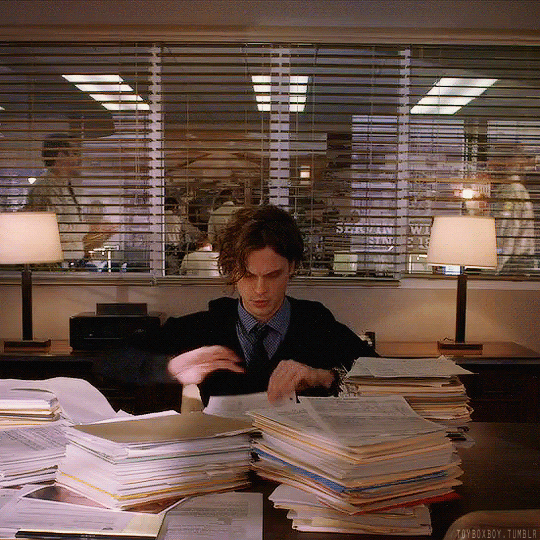
1. Do let the audience follow the character’s thought process.
As demonstrated by: Tommy Shelby from Peaky Blinders
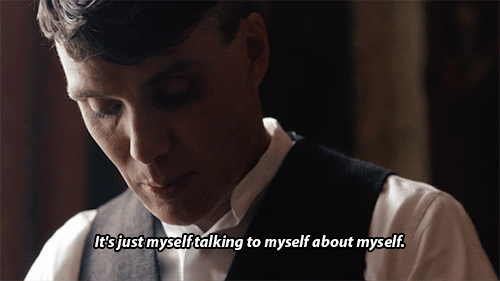
Albert Einstein allegedly once said, “If you can’t explain it to a five-year-old, you don’t truly understand it.” And the sentiment rings true: true genius doesn’t need to dazzle with big words and technobabble. Instead, it makes the complex appear simple.
The same rings true for brilliant characters. BBC’s Sherlock (more on that later) ceased to satisfy in its later seasons because it began to rely too heavily on visual glitz to avoid actually explaining its mysteries and how they were solved. Similarly, the biggest complaints with block buster franchises -- Star Wars, The Avengers, Game of Thrones -- is that they became obsessed with “subverting expectations” cleverly instead of leading the audiences to their most logical and satisfying conclusions.
Meanwhile, the smartest and most satisfying media dazzles not by staying over the audience’s head, but by illustrating how simplistic the solutions can be.
Let’s start with my boy Tommy Shelby, the charismatic, swaggering protagonist of the charismatic, swaggering crime drama Peaky Blinders. Using only his intelligence (and complete disregard for his own life/suicidal tendencies, but that’s not the point here), Tommy claws his way up from the near-bottom of the social ladder (an impoverished Romani in early 20th century Birmingham) to being a decorated war hero, to being the leader of a feared razor gang, to dominating the race track business, to becoming a business mogul, to becoming a member of parliament and trying to assassinate the leader of the fascist party. He’s also one of the paramount reasons why I’m bisexual.
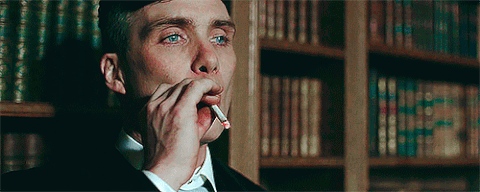
So how can such a drastic social climb be conveyed believably? Because Tommy -- as the viewpoint character -- is placed in seemingly inescapable situations, and then proceeds to demonstrate that the solutions to those situations have been there the whole time. I recently watched a brilliant video on how this is done, which can be viewed here.
Early in season one, for example, he responds to aggressive new methods by the police by organizing a mass-burning of paintings of the king, and uses the press this garners to publicly shame the methods of the chief inspector who’s been antagonizing him. In the next season, he talks his way into a deal by bluffing that he planted a grenade in his rival’s distillery. My personal favorite is in season four, when he responds to being outgunned by a larger, American gang by contacting their rival -- none other than an Alphonse Capone.
All of Tommy’s victories are satisfying, because they don’t come out of nowhere -- we have access to the same information he does, each victory is carefully foreshadowed, and we are reminded at every turn that failure is a very real possibility (more on that later.) So when he wins, we’re cheering with him.
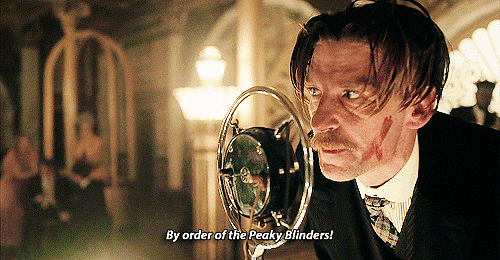
Other examples: Mark Watney from The Martian, who explains science in its most simplistic terms and with infectious enthusiasm. He would make every character on The Big Bang Theory cry.
Also, Miss Fisher from the AMAZING Miss Fisher’s Murder Mysteries. The dazzling, 1920s, female Sherlock Holmes of your dreams. I cannot recommend it enough.
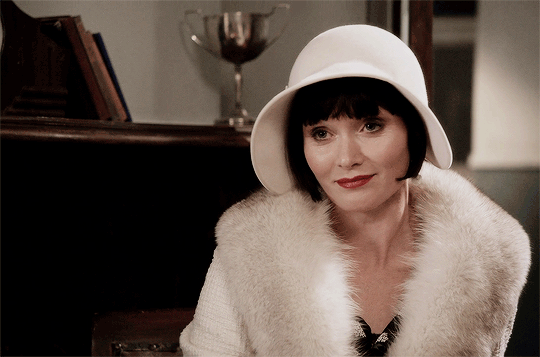
To apply this to your own writing: Remember you won’t dazzle anyone if you smack them in the face with a “brilliant” plot twist. They want to take a journey with your character, not be left in the dust.
Also, for everyone in my askbox concerned that they’re not smart enough to write intelligent characters, just remember how simple the problems confronting smart characters can be. Put them in a difficult situation, and provide them with a means of getting out. Then, just let them find it.
2. Don’t assume the audience is too stupid to keep up (or try to make them feel too stupid to keep up.)
As demonstrated by: Sherlock Holmes from BBC’s Sherlock.
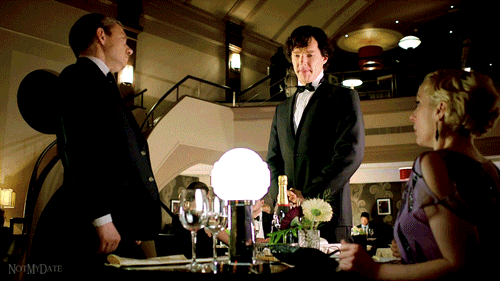
Say what you will: there were reasons why everyone was so captivated by this show during its first two seasons. It felt fresh. People had yet to become frustrated with the inescapable thirst for Benedict Cumberbatch. The writing was sharp, and the editing clever. And it wove a tantalizing web of mysteries that demanded solution. The problem was, there weren’t any.
The most frustrating for many was how Sherlock faked his death at the end of season two, after which devoted fans spent two years creating intricate theories on how he might have pulled this off. The creators responded by mocking this dedication in the opening episode of season three, by showing a fan club spinning outlandish theories (one of which included Sherlock and Moriarty kissing.) This might have been laughed off -- at the time, many seemed to consider it quite funny -- if the creators had bothered to offer their own explanation of how Sherlock survived. They didn’t. And so began a seemingly endless loop of huge cliffhangers that promised -- and consistently failed to deliver -- satisfying answers.
The most egregious examples occur in season four, which provided answers to questions no one asked, and withheld answers for things everyone wanted to know. For example, did you know that the real reason Moriarty engaged Sherlock is because he was hypnotized by Sherlock’s secret evil sister? The same one who killed Sherlock’s best friend, whom Sherlock convinced himself was a dog? Yes, that was a real plot point, in the climax of the series. It’s an effort to befuddle the audience with brilliant and unexpected writing, but instead pulled them out of a story they were already invested in and made them far more critical of its pre-existing faults.
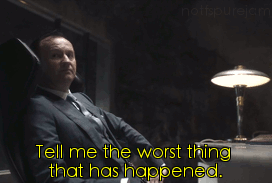
It’s pointed out in the brilliant (if bluntly named) Sherlock Is Garbage, And Here’s Why that Moffat can be a great writer, but is a consistently terrible show runner, because he’s more interested in dazzling the audience with cleverness than actually telling a satisfying story. The video also points out that the show often implied Sherlock’s brilliance, without ever letting the audience follow along with his actions or thought-process in a way that DEMONSTRATED his brilliance.
I highly recommend giving the aforementioned video a watch, because it is not only a great explanation of how Sherlock Holmes can be best utilized, but about how writing itself can be best utilized.
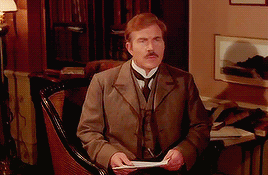
Other examples: The Big Bang Theory. As Wisecrack points out in their wonderful video on the subject, the punchline of every joke is “oh look, these characters are smart nerds!” which is repetitious at best and downright insulting at worst.
How to avoid this in your writing: Treat the audience as your equal. You’re not trying to bedazzle them, you’re trying to take them on a journey with you. Let them be delighted when you are. Don’t constantly try to mislead them or hold intelligence over their head, and they will love you for it. Also, cheap tricks do not yield a satisfying story: readers will know when you went into a narrative without a plan, and they won’t appreciate it.
3. Do remember that smart people can be kind and optimistic!
As demonstrated by: Shuri from Black Panther.
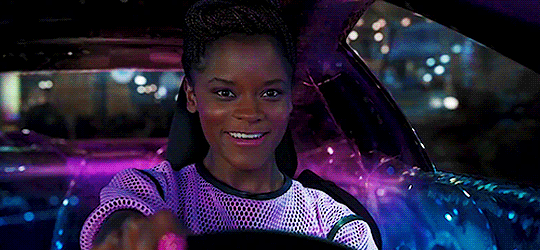
Yes, brilliant people can be unhappy and isolated by their intelligence, or rejected by society. But remember that intelligence isn’t synonymous with a cantankerous attitude, or an excuse to be a pugnacious ass to those around you!
Part of the reason why Shuri of 2018′s Black Panther was such a breath of fresh air was the fact that she subverted almost all preconceptions about how a genius looks, acts, and regards the world. And it’s not just the fact that she isn’t a sullen, middle-aged white man that makes her stand out: Shuri has an effervescent attitude, and genuinely loves contributing to her country and family. She referred to sound-proof boots as “sneakers” (and then explained the pun when her brother didn’t get it.) She’s fashionable. She teases her older brother, and cries when he is apparently killed. She’s up on meme culture. This makes her unlike pretty much every other genius portrayed in the MCU.
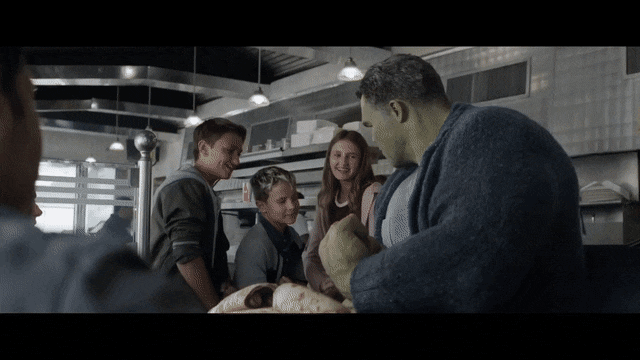
Except maybe the Hulk. He can dab now.
Shuri is also allowed to take pride in her genius, and can be a bit insufferable about it, which makes her more enjoyable and rounded. But she is an excellent example of how genius can be explored and portrayed in fiction, and I will forever be embittered that she was underutilized in Infinity War and Endgame.
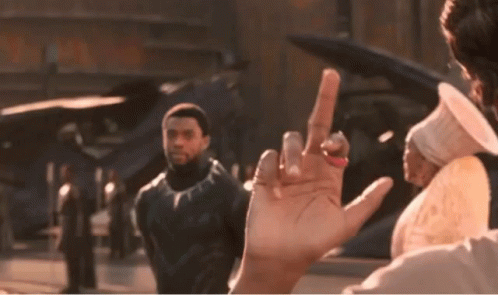
Why, for example, are all geniuses portrayed as arrogant misanthropes? Albert Einstein battled depression, but he is also said to have enjoyed blowing bubbles and watching puppet shows. He was kind to those who knew him. Similarly, Alan Turing behaved little like his fictional counterpart, described as “shy but outgoing,” with a love of being outdoors. Nikola Tesla fell in love with a pigeon. Why do we have to portray these people so damn gravely?
Other examples: Spencer Reid from Criminal Minds. Also an excellent portrayal of an intelligent person on the autism spectrum, as he struggles to interface socially but cares profusely for his fellow human beings. He is brilliant, and completely precious.
Also, Sherlock Holmes -- the original version, and all faithful adaptations thereof. Anyone who thinks Sherlock is an austere, antisocial jerk isn’t familiar with the original canon. He blushed when Watson complimented his intelligence, for God’s sake.
Then there’s Elle Woods from Legally Blonde and Marge from Fargo. Brilliant, upbeat, optimistic geniuses.
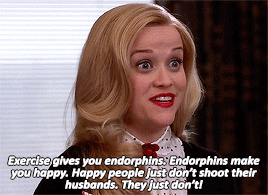
To apply this to your own writing: If you have a smart character who hates everyone around them for no identifiable reason, ask yourself why this is necessary and what this adds to the plot. Are they angry about injustice, towards themselves or others? Are they frustrated with an inability to relate to people? Do they want to protect themselves or their family at all costs, including politeness? If not, question why your brilliant character can’t also be kind to those around them.
4. Don’t make your character perfect at everything they do.
As demonstrated by: Wesley Crusher from Star Trek: The Next Generation.
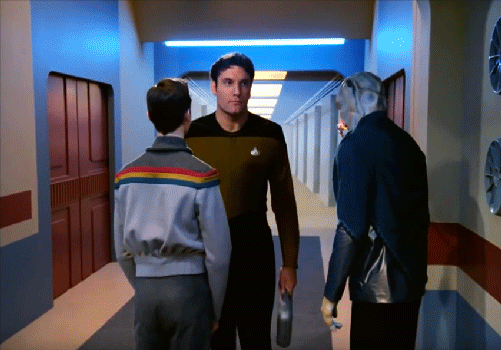
Ah, Wesley. Some call him the original Mary Sue, and it’s one of the only times I’ve seen the term applied with some accuracy. He is somehow the most gifted and least qualified person on The Enterprise. He’s Hermione Granger without the charm, jumping in to answer questions before any of the trained officers in the room have the chance to, always in the right. His only obstacle? Why, the boorish adults he’s surrounded with simply don’t understand his brilliance!
As early as the series’ very second episode, Wesley -- inebriated by an alien illness -- forcibly takes over the ship from Captain Picard, only to later save it from a threat with a reverse tractor beam of his own design.
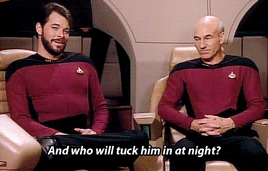
Wesley was obviously inserted as a means of attracting younger viewers, but failed egregiously, because he was too annoyingly perfect for kids to relate too, and not cool enough for them to be invested in. I binge-watched the various Star Trek series in my youth for Spock, Data, and my wife Seven of Nine, not to watch seasoned military and scientific officers get lectured by an adolescent. Even Wil Wheaton, who had the misfortune of portraying this character, expressed a dislike for him.
Precocious children are great, if you get them right. But get them wrong, and they can easily become your most annoying character, marring the face of otherwise great media. The most important thing you can do for a brilliant character is endow them with weaknesses and flaws -- even something as small as Shuri’s fondness for teasing her older brother made her enjoyable, as anyone with siblings could relate to their dynamic.
But, what if you want a supernaturally talented character who not only fails to be a ray of sunshine, but is something of an arrogant, antisocial jerk? Can they still work, especially if they also happen to be a child?
Yes, under one extremely important condition:
5. Do keep your characters out of their depth!
As demonstrated by: Number Five from Umbrella Academy.
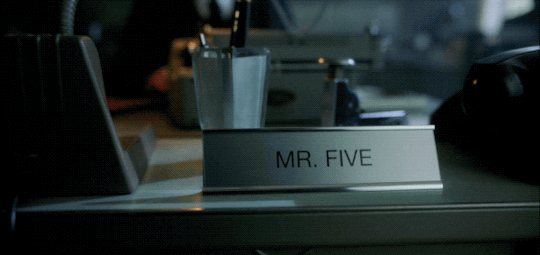
Okay, he’s not exactly a child. He’s a fifty-eight-year-old trapped in a child’s body, who’s traveled back in time from a post-apocalyptic future to warn his siblings of an incoming Armageddon. In other news, Umbrella Academy is a weird show. Unlike the comics, however, the apes don’t engage in prostitution.
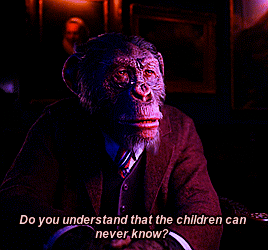
The effect, however, remains the same: a preternaturally talented child who talks down to everyone around him, including his (apparently) older siblings. So why does he work while Wesley fails so egregiously?
For one thing, it’s demonstrated early on that Five has the skills to back up his sanctimonious attitude, with the delightfully ultraviolent Istanbul (Not Constantinople) sequence. It also helps that he lacks Wesley’s squeaky-clean moral code, to the point at which he can get drunk in public or kill without remorse.
But: the element most vital to his success as a character is the fact that he’s kept completely, and consistently, out of his depth. He knows the world will end in eight days, but he doesn’t know how this will transpire or how to stop it. Ultimately, he fails again to stop the apocalypse, and must travel back in time with his siblings for another chance.
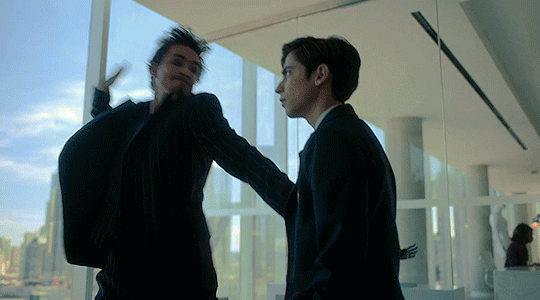
Most authors have the impulse to demonstrate a character’s brilliance by allowing them to succeed against insurmountable odds, but the Umbrella Academy writers show tremendous wisdom in allowing Five to fail. This allows the audience to empathize with him, and countermands the effects of his arrogant attitude.
This advice isn’t just true for pint-sized prodigies. Look back over this list, and take notes of how often the most successful characters are allowed to fail, to have flaws, and to ascend past their comfort zone.
Other examples: Virtually every successful example on this list.
Tommy Shelby, a character of limitless ambition, conducts a new, perilous climb outside of his social rank each season, which almost always puts him in positions of mortal danger. He faces threats both external (rival gangs, evil priests, and rising fascists) and internal (hello PTSD, suicidal tendencies, and crippling addiction) but either way, we understand that his fast-paced climb is not for the weak-willed or faint-hearted.
Mark Watney is a brilliant scientist who has been stranded in an utterly impossible situation for which absolutely no one could be adequately prepared (spoilers: it’s on Mars.) We are drawn in by his plight, and how he could possibly escape from it, and there we come to admire him for his courage, optimism, and humor.
Shuri, though not the main character of Black Panther, is allowed to show off both tremendous gifts and vulnerability, as she is powerless to stop the apparent death of her beloved older brother. She watches Wakanda’s takeover both as an innovator and a young woman, and a large reason for her success is that she is allowed to be both.
How to apply this to your writing: When portraying intelligent characters, take stock of how often they fail, their level of control over their surroundings, their vulnerability, and their flaws. We don’t want to read about flawless deities. We want to read about characters who embody and personify our humanity. So remember they need to fall down in order to pull themselves up.
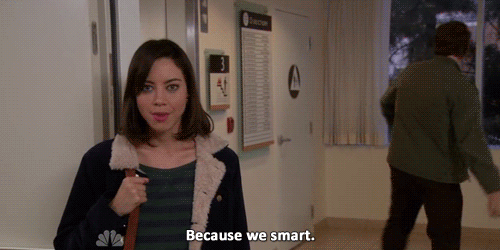
Happy writing, everybody!
#long post for ts#writing tips#writing smart characters#peaky blinders#tommy shelby#mark watney#the martian#miss fisher's murder mysteries#shuri#black panther#spencer reid#criminal minds#legally blonde#fargo#number five#the umbrella academy#star trek#star trek: the next generation
917 notes
·
View notes
Note
Idk if anyone told you but the MVA OST leaked, with themes for both the League and the MLA. If you haven't listened to it yet, please do! And if you have, what are your thoughts? I think Mine Woman and RE-DESTRO slap for 2 characters that got shafted hard by canon so I appreciate them a lot.
I have listened to them, and I like several of them! I feel like I need to lead with that, because I'm about to add some criticism about my previous responses to BNHA's score for context, so it's important to know that I genuinely do enjoy quite a few of these.
So, I haven't listened to a lot of Yuki Hayashi's scores, but he's definitely done work I've liked! He composed the music for several of the more recent PreCure shows, including their movies; I particularly loved his finale for the 15th anniversary film, which prominently featured a truly delightful medley of every team's opening theme. I'm also very fond of some of his pieces for Kiznaiver and Welcome to the Ballroom.
His BNHA work, though, I feel like suffers from two main problems: the tracks are too short to work up a good head, and yet, despite that short length, they sometimes feel exhaustingly over the top. (Did Shigaraki's theme really need crying children to get across the point that he's bad news?) I've long felt that the BNHA anime wants me to feel like everything is way more Epic and Stirring and Dramatic than I actually find the material to be, so curiously, the music winds up having a distancing effect rather than drawing me in. This is frequently compounded by placement choices that feel so staggeringly poor that I'm often left wondering whether the staff chose the music out of a hat! (Seriously, why does a fairly rote test of character in Nighteye's office warrant doom choirs?)
As to the MVA tracks specifically, I wish there could have been tracks that sounded a bit more fun or heroic, given that the League in MVA really are the heroes for the arc, complete with Shigaraki suddenly having access to Shonen Nakama Tropes and getting all these little comedic reaction takes. It'd be nice if the music could cue in and let the League have some aural triumph without being all doom all the time ("Oh, no! The villains are winning!" Yes, they are; let them have this for one arc, would you?)
But that said, I do rather like most of these! There are some that I do suspect will fall prey to the This Is Too Much Drama, Would You Please Ratchet Back? problem, but there are also some that I can imagine playing better in the context of the show than they do in isolation, and some that feel like they could even be exactly what I was dreaming about, if they go where I hope they will. For some individual thoughts, see below:
The Mission of the Stealth Hawks: A reasonable enough little tense atmospheric piece. Doesn't jump out at me.
Different Ability Liberation Army: I always approach the MLA as styling themselves as an army, but in reality being more of a sect--far more cult than militia-- I appreciate that if they can't have a good dramatic march despite having Army, like, right there in the title, I'm glad I could get church bells instead. On the whole, though, this is a good example of the first problem I mentioned having with Hayashi's work for BNHA--his pieces tend to be pretty short, and it takes them so long to land on a melody that by the time they find one, there's hardly any time to develop it before the song ends. Even a lot of the hero pieces are like that, and the villain songs, even more so. That said, I do like the horror strings that creep in around the 1.25 mark, blossom at 1.45, and float on through 2.10. I just wish they went on longer.
Admittedly, "erratic church bells and horror strings" is still not the choice I would have made for the MLA's main theme. I really would have preferred something with a more militant air; as it is, this sort of feels like it scores a creepy prologue that plays before the opening credits kick in and then the episode proper starts. Which isn't a bad description for the way the dinner scene played in the manga, but thanks to the anime's decision to reshuffle everything, I don't think that dinner scene's going to maintain that feeling of "prologue" when we finally get to it.
My Villain Academia: Better on the melodic front; I enjoy the drama at .43, the dancing tension at 1.05, and particularly the minor strings from 1.25 that just keep climbing until everything else drops out around 2.10. I do wish it found a better place to end rather than noodling on for a further thirty seconds, but the melody will get a more central, and more bombastic, treatment in the final track, so it's probably okay for it to trail off here. (It's also apparently a reprise of a villain theme from the very first season's OST, which is rad. More on that in the Track 11 blurb.)
Second Coming: This is a bizarre one because, while I complained that Hayashi's BNHA tracks are usually short, this one is a full six and a half minutes--except that it falls clearly into movements of about a minute each, with clear lulls in between. I wish it was twelve minutes and everything was twice as long! As it is, I'm highly doubtful that we're going to hear this one played in its entirety anywhere, since I can't imagine what scenes would require this specific sequence of musical passages at this length.
0.00 - 1.01: I love that the song kicks in comparatively quickly; the first minute's passage has a great, thrumming drive that very nearly hits major key towards the end.
1.02 - 1.53: The drive picks up pace in the second minute before the chorus arrives, and for once, I am very prepared to love a BNHA choir piece. I hope this is what plays when Deika's going up in ash.
1.54 - 3.01: I love the melodic line being carried by the intentionally hard to distinguish violin and whatever brass instrument the violin's trading off with in the third minute. It's bit out of place with the rest of the track, but I like it quite a bit on its own, and it does have a similar sound as some of the "dirty" brass in RE-DESTRO and Mine Woman. It's probably too long for RD's childhood flashback, but I wonder if it'll play for an MLA character somewhere?
3.02 - 4.07: The fourth minute has some very fun drums, but otherwise doesn't jump out at me as much of the rest of the track. I'm very curious to know when this will play, though.
4.08 - 5.32: The fifth minute, god bless, has some proper march drums--I like this passage a lot, particularly when it come back in the sixth minute accompanied by the choir. I like this because the key is minor but it's not "oooo scaaaary" minor; it's more dramatic, a bit tragic, but triumphant too--pretty much perfect for Re-Destro, Spinner and Machia's moment of revelation in the crater. I wish it were longer.
5.33 - 6.36: And here for the end we're back to the driving guitar and some fun low-thrum strings and percussive chain sounds. Like the fourth passage, it's fun, but jumps out at me less, particularly as the song's finale.
Gigantomachia: This is an extremely boss kaiju song. Seriously, that brass in the opening could come right out of a Toho flick. Extremely good walking calamity number, love that distorted synth stuff towards the end. It's going to sound great when (if) it plays over Machia leaving the villa, the hand rising up through the floor behind Toga, Momo and the other students surveying the desolation left in his wake, and so on. (I know that's all Season Six material, shhhh. I hope they use this piece there.)
Mine Woman: This is so fun. And so extremely superior that that awful Christmas insert song! I'm glad Curious got this at least, and I love the moment the beat drops at the one-minute mark, and that interwoven sax. So good. It's hard to imagine the fight between Toga and Curious being paced to this song, mind, but it's real good, anyway.
TOGA's Nature: This one showcases the other problem I have with Hayashi's BNHA work, especially his stuff for the villains: it feels very on the nose in a way that tips over into being Too Much. The birdsong, I think, is on the nose but in an effective, playful way, with the natural beauty of the birds undercut by the lovely but ominous piano/synth melody. I am considerably less kindly disposed to the creepy child laughter, which just feels on the nose in a thuddingly obvious way--though I do like the way it slides in when the birdsong fades. I like, too, the sort of cloudy roaring reprise of the melodic line that kicks in around the 1.10 mark. It feels like an effective echo of Toga--cute but creepy as a young girl, and then, after she snaps, creepy in the same way but now you can't ignore it.
Symbol of Fear: The beginning doesn't do much for me, but I enjoy the howl that gives way to the organs at 1.15; while it's too action-heavy to be Tenko, the transition does still put me in mind of Tenko wandering the streets, internally crying for anyone to help him, and the person who finally does is--well. I like that the organ nurtures that howl into something considerably more dire, though you still get a return to that guttural cry periodically. While it is, again, difficult to imagine this scoring the scenes between AFO and Tenko's first meeting and Tenko being formally named Tomura--it's much too bombastic--it does still feel like an excellent representation of AFO sculpting Tomura's formless, aimless rage into something that really could tear down the world.
I Don't Kill My Friends: It would have been really nice if they'd let the most significant, unadulterated personal triumph of the arc sound actually fun. Why does the Sad Man's Parade song sound so upset?? @aysall predicts that it'll play over Twice's confrontation with Hawks and death scene, and I can see it working extremely well there, but it's a pretty weird call for the Dead Man's Parade bit, if that is indeed what this is intended to evoke. Quibbling about the title aside, I do like the way this pulses and throbs, something like an exposed wound, which is not a bad description of poor Jin's mentality. I still hope this isn't what scores his breakthrough, though. As I said previously, the villains are the heroes for just this one arc, and it'd be nice if the score could reflect that at least a little.
RE-DESTRO: I like this one a lot. I love the interwoven layers of that dirty sax and the Big and Dramatic orchestral strings + brass, but both of them undercut with that regular, machine beeping that could almost be a heart monitor, but mostly isn't--right up until the long beep at 1.52/1.53. It feels like a strong illustration of the titular character's different personas--his attempts at casual, friendly villainy (like menacing Giran or chatting with Shigaraki on the phone), him when he's thundering full-volume about the weight of his legacy at people (THE BLOOD OF DESTRO FLOWS THROUGH THESE VEINS I AM RE-DESTRO), and, beneath it all, the constant little thread of stress that Rikiya can never escape (right up until Shigaraki). I probably wouldn't love it so much in isolation, but I'm easy to win over with the right character association. XD
Paranormal Liberation Front: Very fun grubby guitar intro. It also has much the clearest melodic throughline, which inclines me towards it. What inclines me to it even more is the knowledge (per @aysall again) that it's the same main melody as the track Villains Theme from the very first season's OST. That track already having used its allotted Doom Choir quotient, this track makes do with less synth and a lot more orchestra and chunky bass backing, which is much to its benefit, I feel. I do wish it had any of the MLA's theme in it, to represent the merger, but admittedly, it'd be hard to make that very audible when the MLA theme has…next to no central melody, percussive rhythm, etc. Still, as an evolution of the League to something bigger, classier, and far more dangerous, it's real good--just long enough to develop into itself and explore its central leitmotif. Probably my favorite track simply on its own merits.
Thanks for the ask, anon! I'd listened to the tracks once driving around for work, but sitting down with them properly gave me a greater appreciation for them, and now I'll definitely have an ear out for them when we get to this material in the anime…
….whenever that winds up being. *sob*
#bnha#music#stillness answers#my villain academia#reviews?#league of villains#meta liberation army#shigaraki tomura#yotsubashi rikiya
9 notes
·
View notes